History
1897 - 1915
Much has been written of the formation of Mansfield Town Football Club and many dates have been given, however most are apocryphal or at the very least wildly inaccurate.
Although organised football existed for many years in Mansfield before this, the origins of the present club can be traced back to 1897 and the Wesleyan church on Bridge Street.
The exact meeting where the seeds were sown is now lost in the midst of time and as such no exact date can be given for the formation. However, a team formed by Frederick Abraham and Thomas Cripwell called Mansfield Wesleyans eventually became the Mansfield Town we all know and love.
After the formation in those early days, no league was entered. The team played only friendly matches plus the odd local cup tie. The team played in a light blue and chocolate-striped kit and played almost exclusively at a ground on Westfield Lane.
The first match was played at this ground on 04 September 1897 against Sherwood Foresters and ended in a 2-2 draw. Unfortunately, no details survive of the XI that turned out that day, but we do know that the Foresters' Statham scored an own goal and Taylor found the other for Mansfield.
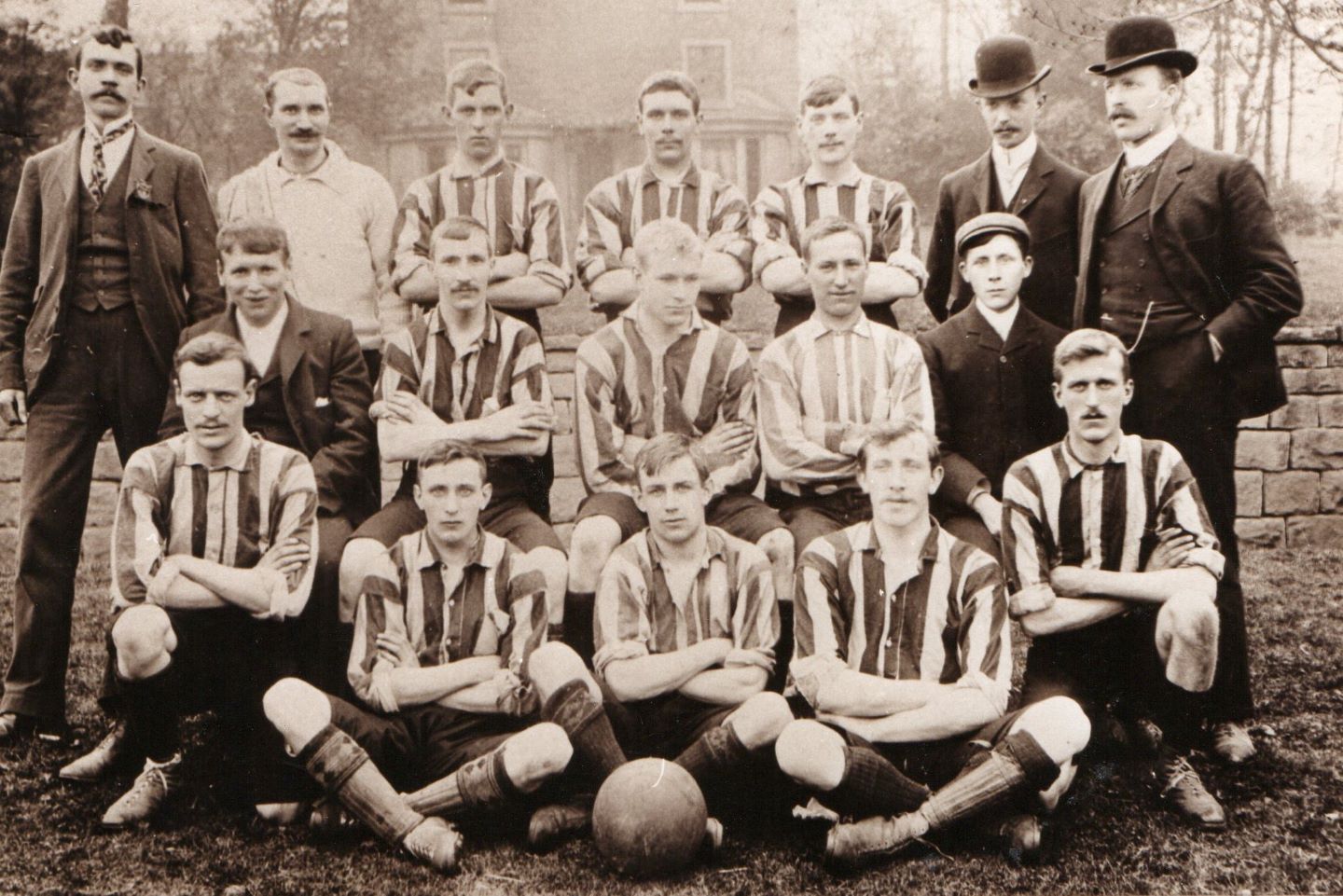
Squad Photo: 1903
By the start of the 1902-03 season, the club had decided to enter the Mansfield and District Amateur League, and on 06 September 1902, played its first ever league game - a 1-0 defeat at the home of Mansfield Corinthians. The team for this auspicious occasion was:
Hodgkins; Benton (Sid), Sadler; Hibbert, Trenam, Osborne; Martin, Tattersall, Wilson, Gunthorpe, Abraham.
Of this side, Walter Tattersall later went on to play for Tottenham Hotspur and Watford. A week later, the team's second fixture, also away from home, was a disastrous 13-0 drubbing at Shirebrook Swifts.
For the record, no Stags' first XI has ever suffered such a stuffing since! Thankfully, the performances did improve and the season ended with the team in a comfortable seventh position out of the 12 teams competing in the league.
There was some progress made the following season when a very respectable third placing in the league was achieved. It could have been better, but the club had two points deducted for fielding an unregistered player. With those two points, the Wesleyans would have been runners-up.
For this season, the club moved to play home games at the Newgate Lane ground. There was a dip in fortune the following season, with a drop to fifth place in the league. By 1905-06, the club were back up to third spot.
Changes were afoot in the summer of 1906, when the M&DA League dropped the 'Amateur' from their title and the hierarchy of methodists immediately disowned the football club and forbade them from being called Wesleyans.
The club reacted by changing their name to Mansfield Wesley and ceased to have anything to do with the church. Now with a new name and now openly professional, Wesley moved into a higher sphere of football and joined the Notts & District League.
A creditable sixth position in their first season in the new league against superior opposition than in the previous years showed that the club had indeed progressed.
Further evidence of this came from the Notts FA, who now transferred them into the Senior Cup competition from the Junior competition of previous years. The club also played in its first ever cup final when they unfortunately lost to great rivals Mansfield Mechanics by a 4-1 scoreline in the Mansfield Hospitals Charity Cup.
The 1907-08 campaign was similar to the previous term with a respectable fifth placing in the league, but no success in either cup competition. The following year (1908-09) saw some high scoring matches, and the team finished one place higher in the table. Belper Town succumbed to eight goals in December and then in March, Long Eaton St. Helen's let in one more as they went down 9-0.
The chief goalscorer was a Hucknall lad named Jack Needham, who notched an amazing 46 goals in the 35 matches he played. His haul included four goals on four occasions and a further three hat-tricks. At the end of the season, he moved on to Birmingham and had a long and successful career in the Football League.
The following season turned out to be a very traumatic one for the Wesley. There was trouble off the pitch when chairman Fred Abraham and secretary James Marples resigned.
Later in the season, both were banned sine die by the FA for serious irregularities, it turned out that they had signed a player on the Sabbath (day of rest) - a heinous crime in those long lost days.
The player they signed, William Whitby, was not disciplined, but the club lost two points for turning him out as an ineligible player. On the field, Needham was sorely missed as the club dropped to 17th place, one off the bottom.
Another milestone was reached this season too when the club entered the FA Cup for the first time. They played in six matches before being eliminated by local rivals Mansfield Mechanics in the second qualifying round replay.
The summer of 1910 saw another important change, when at the AGM, it was proposed that the club change name to either Mansfield Town or Mansfield United. It was thought this benefit the image they were trying to project as the major club in the town.
It was put to the vote and 'Mansfield Town' was accepted as the new name.
Mansfield Mechanics, Town's most bitter local rivals, objected to this as they thought (probably correctly) that they were the premier team, however, their protest to the FA fell on deaf ears. To further project the new image, a change of strip was also accepted and so the following season red shirts and white shorts were worn.
And so to war....
The 1910-11 season saw the team regularly find themselves in a mid-table position in the league, ending in an equally mid-table position of ninth. On 17 April of this season the first team played two matches!
In a morning kick-off they lost 2-1 at Pinxton and in the afternoon they recovered sufficiently to take a point from a 1-1 draw with Stanton Hill Victoria, with eight players turning out in both matches. They were reasonably successful in the cup competitions when the fourth qualifying round of the FA Cup was reached, along with the semi-final of the Notts Senior Cup.
In the summer of 1911, a new league was formed. It adopted the name Central Alliance. For the inaugural season, 12 clubs were accepted as members - amongst them were Mansfield Town.
Town had a very poor season finishing in 11th place, one from the bottom. The new colours brought in for this season (black and white quartered shirts and black shorts) obviously brought them no luck at all.
Finishing in such a lowly position meant that the club had to apply for re-election. Lady luck did smile down at this point as, with a plethora of clubs trying to get in, it was decided at the AGM to re-elect the bottom two clubs unopposed and extend the league to 18 clubs.
There were mixed fortunes in the cup competitions when in the FA Cup, the Stags bowed out at the first attempt to Hinckley United. The club did reach the semi-finals of the Notts Senior Cup where for the second season in a row, Notts County's reserve side proved too strong.
More trouble loomed before the start of the 1912-13 season as the club were forced to find a new ground. The Great Central Railway decided to extend their line through the middle of the Newgate Lane ground.
Given little time to find new accommodation, they had to settle for the old ground on Radcliffe Gate. The club had played here before in 1900-01 season when there were no league fixtures.
The 'new' ground was nicknamed 'the Prairie', and had no facilities whatsoever; the players even had to change in the Brown Cow public house.
This was probably not much of an imposition as they were used to changing in similar facilities in the Carpenter's Arms when they played on Newgate Lane! On the pitch, the club fared much better than the previous season when a comfortable 12th position was obtained.
In part, this was no doubt due to the goalscoring expertise of Freddie 'Fatty' Blackwell, who netted 39 times to set a new Central Alliance record. He had only one season with Town before moving to Shirebrook for two seasons. Blacknell then went to war and was killed at Ypres in October 1916 aged just 24.
Five matches were played in the FA Cup before Sutton Town ended the run in the third qualifying round. The semi final of the Senior Cup was reached for the third time in a row but, the other Sutton side, Sutton Junction, triumphed on their own ground.
In the summer of 1913, the club were warned as to the state of the ground. Numerous complaints had been received by the management committee the previous season, and so the club were given until the start of the season to improve things.
By October, Town had been warned again, as matters had obviously not improved. The team struggled all season and did not win their first match until the end of November, and in all, only six league matches were won all season with the club ending in 13th position (out of 16).
The cups did not offer much consolation either as only the second qualifying round of the FA Cup was reached and the first round of the Senior Cup. The lowly league position left the club applying for re-election for a second time.
This time there was no lady luck and so the following season, Mansfield returned to the Notts and Derbyshire League. No doubt the standard of the playing area cost the club dearly when it came to the vote.
The 1914-15 season, even playing in the lower standard, did not start well with the first victory not coming until Boxing day. From then on in, however, only three more defeats were suffered all season and in the end a very respectable fourth place was achieved.
There was no cup success though as Town bowed out of the FA Cup to Sutton Town by a 5-0 scoreline, and in the second round of the Senior Cup, Notts County Reserves triumphed 2-0 at Meadow Lane.
By the summer of 1915, the Great War was in full swing and many teams lost players, and consequently the different leagues lost a number of clubs who closed down for the duration.
The Central Alliance was no different, and when Mansfield Town applied to rejoin that League for the 1915-16 season, they were gratefully accepted back into the fold. Even with the addition of Town and New Hucknall Colliery (who had played with Town the previous season) only nine clubs completed the season.
Town did not perform well and only a run of four wins in the last five games saw the team rise to finish in sixth position.
With so few clubs, the League season finished on 27 December and so a second, subsidiary competition was organised. Three of the nine competing clubs declared that they could not complete the season and so only six teams continued.
The secondary competition turned out to be remarkable for Mansfield Town as they proceeded to win all 10 matches and win the competition easily, rounding off the season with a magnificent 10-1 win over Sutton Junction.
It has to be said that most of the other clubs were losing players at a faster rate than Town, but even so, winning all 10 matches is still quite a feat.
By this time, of course, the FA had abandoned their cup competition for the duration - as had the Notts FA - so there were no cup competitions at all that season.
One other match was played, however, when Town played the Mechanics at Field Mill (the-then home of the Mechanics) to raise funds for the Footballer's Battalion. Town won the match (which was abandoned due to bad light) by a score of 4-0, however only 50 spectators attended and raised the miserly sum of just 12 shillings and sixpence!
At this point, the Alliance also decided to call it a day until the end of the war. Some clubs decided to carry on playing just friendly matches, but at their AGM in June, Town also decided to close down for the duration.
Mansfield Town's Field Mill ground, now known as the One Call Stadium, is the oldest professional football ground in the world.
Field Mill has been used as a football ground since 1861 (and as a cricket ground for a few years before that).
The Sandygate Road ground in Sheffield, which was first used in 1860, is the oldest football ground in the world. It is currently used by Hallam FC. Bramall Lane, the current home of Sheffield United, was first used as a football ground in 1862 (though like Field Mill, was used as a cricket ground for a few years before that).
One Call Stadium is therefore the oldest football ground in the world that hosts professional football. It is also the oldest football ground in the Football League.
Field Mill staged the first competitive match to be played under artificial light in this country when the North Notts League Senior Cup final was played at Field Mill under floodlights in 1930.
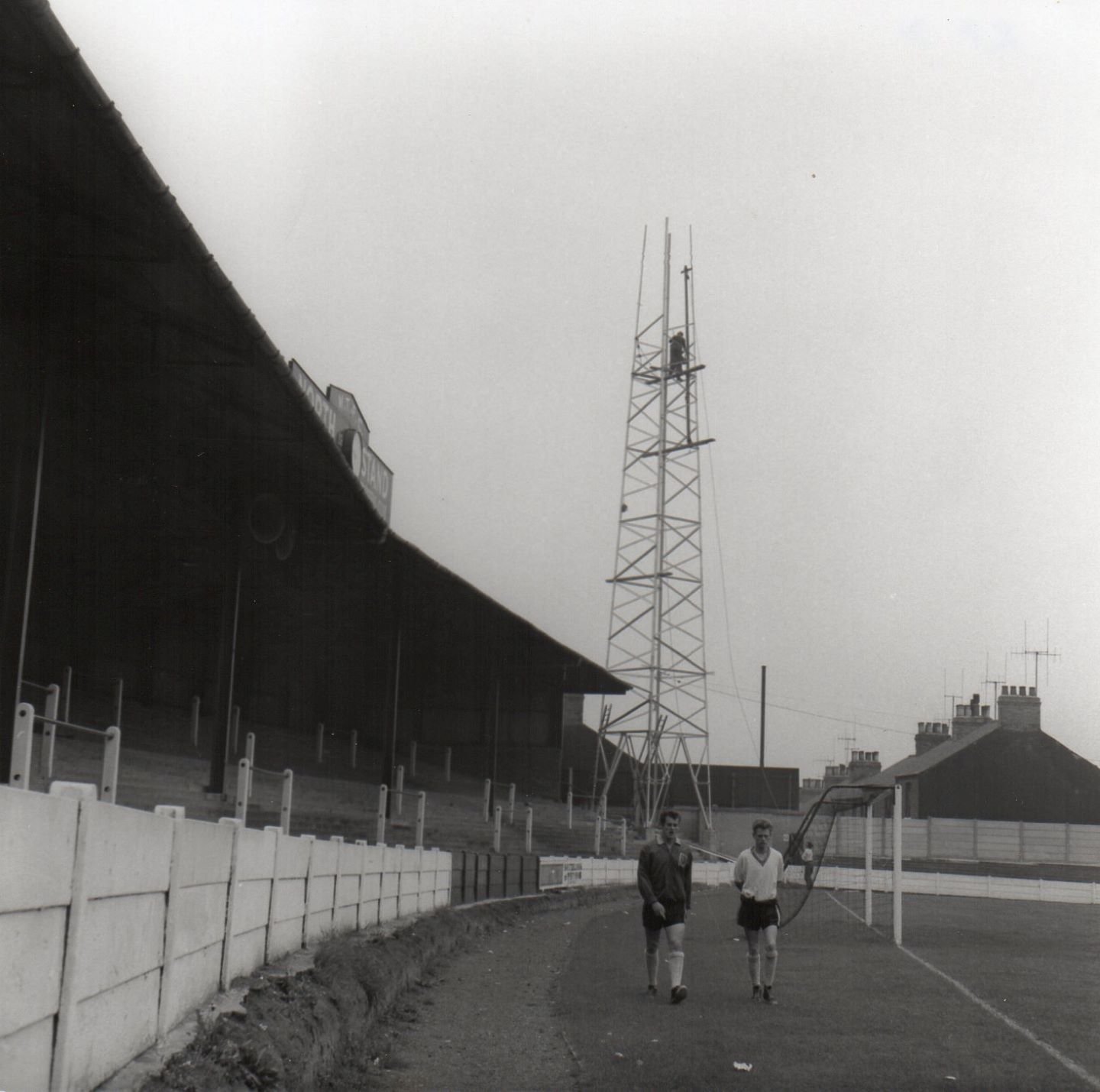
National exposure for the stadium was gained in 1998, with the first match ever played with a new yellow fluorescent ball took place.
The first football team to be formed in Mansfield was the Greenhalgh's XI, founded in 1861 for the employees of Herbert Greenhalgh's cotton doubling business, which was based at Field Mill. The Field Mill itself was a five-storey building between Quarry Lane and Portland Street.
The building was badly damaged by fire in 1904 and lay derelict until demolished in 1925. The mill pond, sitings for the waterwheel (at 40 feet in diameter believed to be the biggest in Britain) and the mill manager's home (which became the Early Doors pub and then an Indian restaurant) still survive today.
On the opposite side of Quarry Lane to the mill was a field which, as part of the mill complex, was used for the works cricket team and, from 1861, was also used in the winter months for the newly formed football team. At this time, the field was known as Greenhalgh's Ground. Later, it was to be known as the Mill Field, and from around 1885 as Field Mill.
The Greenhalgh's team became known as Mansfield Greenhalghs and built itself quite a reputation around the midlands. The team entered the FA Cup in 1891 (losing 2-0 away at Heanor Town) and a year later, the first FA Cup tie was played at Field Mill, a 5-2 victory over Eckington Works.
Mansfield Greenhalghs joined the Midland Counties League in 1894 and finished a creditable fifth in their first season. The original Mansfield Town (no relation to the present club) finished as wooden spoonists.
The cost of this level of football proved too much for both Mansfield clubs and in the summer of 1895 they merged and a new club, called Mansfield FC. The new club played on the Stanhope Street ground in the town.
After the demise of the Greenhalgh's team, Field Mill was not left vacant as two teams (Mansfield Amateurs and Old Meeting House) moved in and shared the ground. Old Meeting House moved out in 1900 and Mansfield West End moved in to replace them, but they only lasted two years.
After this, the Amateurs had the ground to themselves until 1911. When the amateurs moved on at the start of the 1911-12 season, Mansfield Mechanics moved in. The Mechanics, who were the premier team in the town at that time, held a lease on the ground from the Duke of Portland until 1917.
However, when the 1915-16 season was completed, the Mechanics closed down for the duration of the Great War and the lease was allowed to lapse.
Mansfield Mechanics expected to renew the lease, but in 1919, the Mansfield Discharged Disabled Soldiers and Sailors (Mansfield DDSS) formed their own team and approached the Duke of Portland in regards to playing their games at Field Mill. With the Mechanics still dormant, they were offered a lease on the ground, which they accepted.
The new club was not sure they could sustain the expense, so they approached Mansfield Town to see if they would share the cost. Town were delighted to accept because they too were groundless as their old ground, called the Prairie, had been dug up for allotments during the war.
The first season after the war, Mansfield Town won the Central Alliance championship and began to have aspirations to join the Football League. There were problems with the ground in that there were fixture clashes with the DDSS, along with Town only being sub-tenants. This was a situation which would not help any future application to join the Football League.
It was learned that the Duke of Portland would not be averse to selling the ground, and a company was formed called the Mansfield Athletic & Ground Co. Ltd. The sale of Field Mill went through on 02 May 1921 for a fee of £500, subject to a covenant being in place which restricted the use to sporting purposes only. At this point, Mansfield Town were given a 25-year lease (to expire on 01 May 1946), so the DDSS were out (their lease had expired on 30 April 1921).
Mansfield Cricket Club played the 1921 season at Field Mill. They too then moved on and Mansfield Town were sole occupants of what they could consider was their own ground.
Greyhound racing was introduced in 1929 for a rent of £400 per year. This was discontinued in 1931 when Town (by then known as 'The Stags') were elected into the Football League.
As alluded to above, there was another great event at the ground when, in 1930, the North Notts League Senior Cup final was played at Field Mill under floodlights. This was the first competitive match to be played under artificial light in this country, though a few exhibition and friendly matches had previously taken place since the Victorian era.
Four pylons - each 18 feet high - were erected, one in each corner of the ground. Phillips Lamps installed fourteen 1000W bulbs on each tower. There was no white leather in those days so a young boy was supplied with a bucket of whitewash and several balls. The balls were dipped in the bucket and changed at frequent intervals during the game.
The match was played on 22 February 1930 and a crowd of around 6,500 saw Ollerton Forest defeat Welbeck Athletic 3-0.
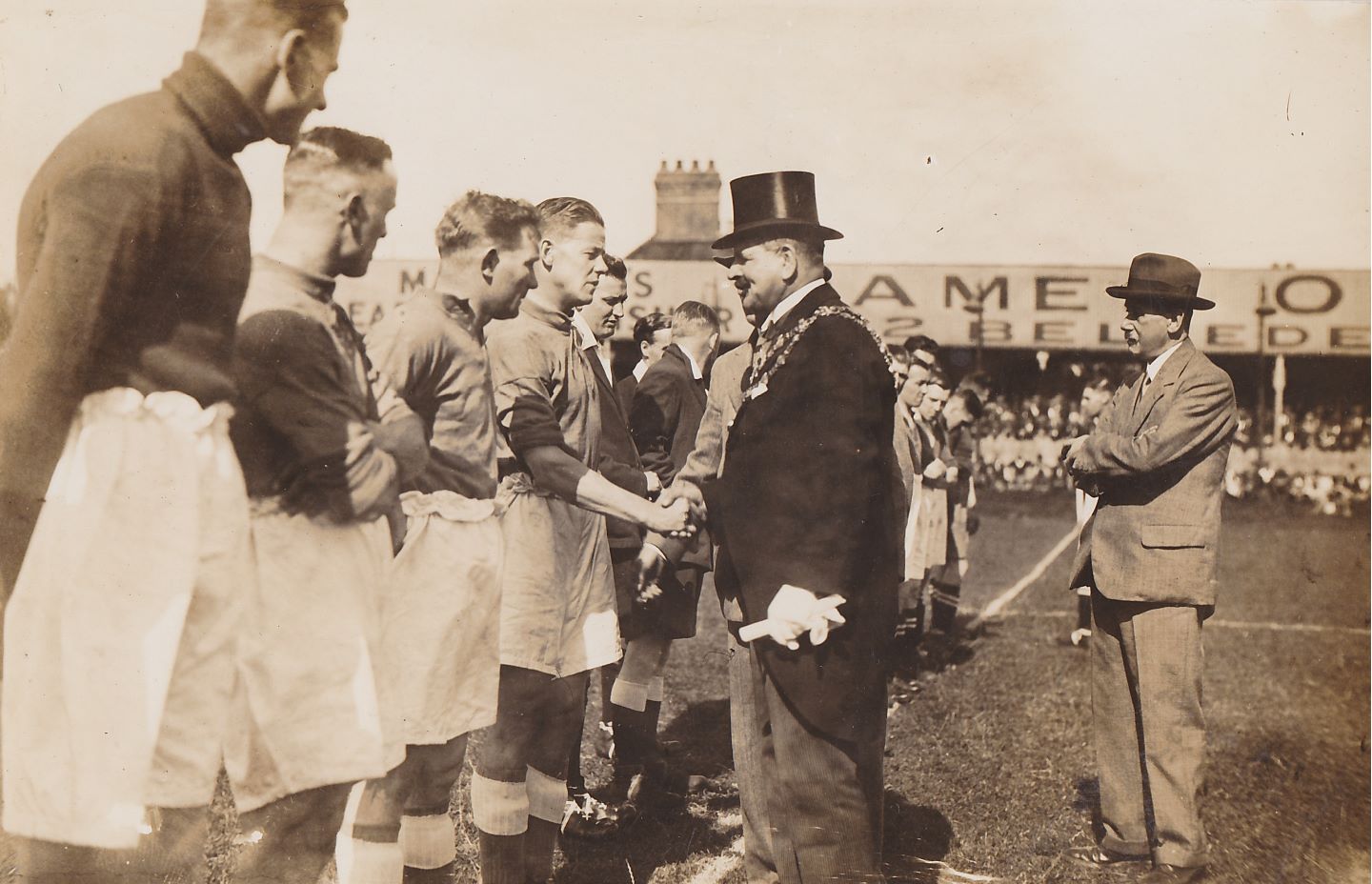
The Stags were elected to the Football League following an AGM in June 1931, and the first Division 3 South game was played at Field Mill on 29 August 1931. The Duke of Portland was present to see Mansfield Town defeat Swindon Town 3-2. Joe Readman took the honour of scoring Town's first league goal.
Following the first post-WW2 season, the Stags' lease on the ground expired. The club were however able to purchase the freehold of the ground (including the covenant) and, having served its purpose, the Mansfield Ground & Athletic Co. Ltd. was dissolved.
National exposure for Field Mill was gained in November 1998, with the first match ever played with a new yellow fluorescent ball. The Stags beat Barnet 5-0, featuring a Lee Peacock hat-trick, and there was second-half commentary on BBC Radio 5 Live.
Field Mill was redeveloped in 2000, with three new stands built: the West Stand (later named as the Ian Greaves Stand), the North Stand, and Quarry Lane Stand (also known as the South Stand).
The stand on the east side of the ground, the Bishop Street stand, is currently in a state of disrepair, and it is planned to be redeveloped in the future. Prior to the redevelopment, the old West Stand stood at Field Mill from the 1960s until 2000. It was modelled on a stand from Highbury and purchased by the Supporters Club from the defunct Hurst Park racecourse in Surrey and transported on lorries to Mansfield where it was re-erected.
The old North Stand, which was terraced with a roof, was much loved by home fans, and built in 1957 funded by the Supporters' Club. The stand came with a clock, and the board surrounding the clock said: 'MTFC North Stand 1957 - Presented by the Supporters Club.'
The wording around the clock was later changed to advertise a local estate agent, John Sankey, with the wording: 'More people use Sankey than for any other reason,' and this shot to fame on the BBC TV programme Fantasy Football League.
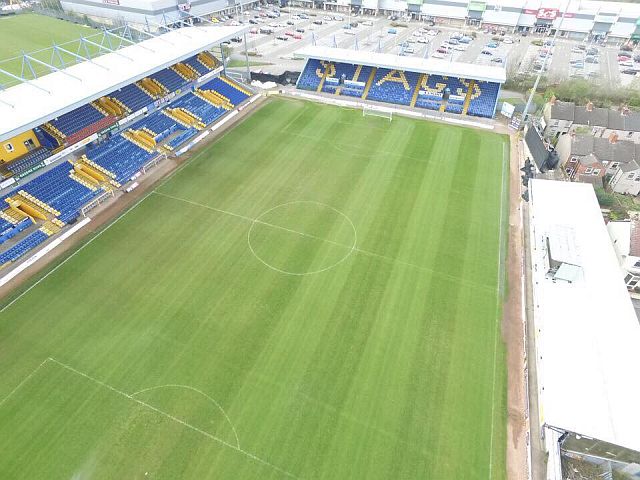
So from 1861, when the ground was basically a field with a cricket pavilion (which the footballers were not allowed to use), the mill field has been used for football and has, certainly since Mansfield Town took up residence after the Great War, been developed into a modern stadium.
References
Mansfield Town: The First 100 Years (The Official History), by Jack Retter with Paul Taylor, Glen Publications, 1997
Images of Sport: Mansfield Town FC, by Paul Taylor and Martin Shaw, History Press, 2007
Mansfield Town: A Complete Record 1910-1990, by Stan Searl, Breedon Books, 1990
1920-1929
This was the decade that really can be described as the club's 'golden years.'
During this period, the foundations were laid that helped turn the club more into what we recognise today. The first major change came as the troops were still being demobbed from the Great War.
Mansfield Mechanics had let their lease on the Field Mill ground lapse during the War, perhaps they couldn't see the point in paying for a ground they weren't going to use. A football club representing the Mansfield branch of the National Federation of Discharged and Disabled ex-Servicemen's Societies (or DDSS for short) beat the Mechanics to the new lease.
They could not afford to pay for the two-year lease on their own and sounded out Town as sub-tenants. Seeking a move from the terrible playing surface of their current home (the Prairie) Town jumped at the chance. So as from 01 May 1919, Town's official home became the same Field Mill ground they still play on today and, as from 30 April 1921, when the DDSS lease expired, the Stags became sole tenants with a 25-year lease.
It was in 1919, also, that the club changed strip yet again. This time, they adopted an amber and blue halved shirt with white shorts. This also gave rise to a new nickname The Ambers (note, no use of the term 'yellows'). It was not until 1924 that the club was referred to as The Stags in the newspaper reports, a magnificent epithet and emblem that has stayed with them ever since.
Where the nickname came from and why it was adopted remains unknown. It is thought that it comes from the stag in the old borough's coat of arms, representing the town's proximity to Sherwood Forest. In 1923, the club's first ever official supporters' club was founded.
The 1920s were also an exciting time on the field too, with Town becoming one of the top (if not the top) sides outside of the Football League, proving this in both league and cup competitions. The first season after the war found the Stags still in the Central Alliance, where in that first season they took the championship.
There was no such excitement in league matches the following year as the club faded to fifth position.
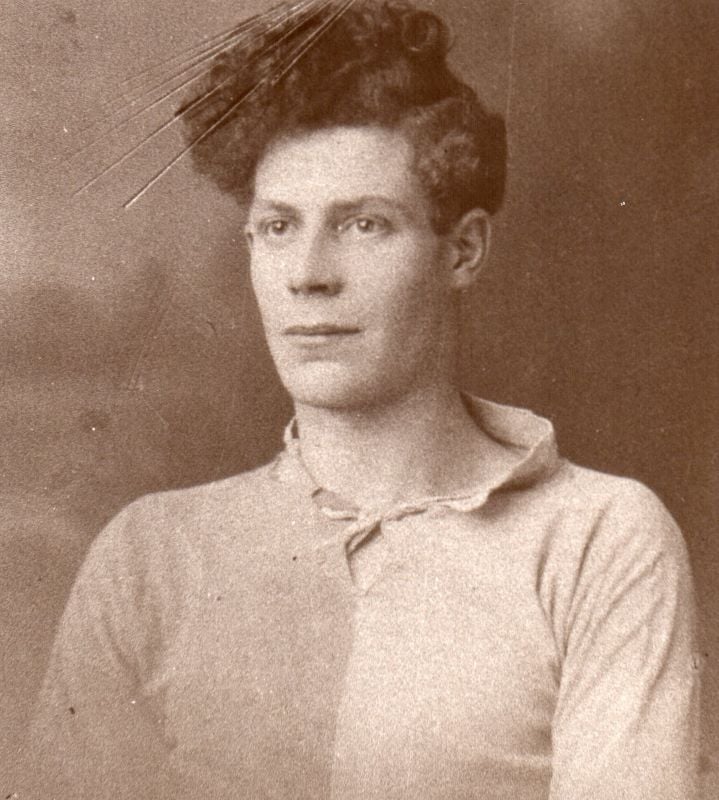
However, they did reach the fifth qualifying round of the FA Cup and the final of the Notts Senior Cup. The club's ambitions were now growing and at the AGM of the Midland Counties League in June 1921, Mansfield applied for, and were successful in attaining, a position in that League. At the time, the Midland League as it was commonly known, was second only to the Football League itself.
The club made a more than satisfactory start in their new status, finishing in a creditable eighth position. It was in the FA Cup where the club were really successful, this time reaching the sixth qualifying round and playing Football League opposition for the first time.
Walsall were the Football League opposition that came to Field Mill in December 1921. The Ambers put in a magnificent display to earn a replay at Fellows Park. Here the run ended as the Saddlers ran out 4-0 winners.
In the 1922-23 season, the Stags finished in a mid-table 13th place in the Midland League, and once again reached the sixth qualifying round of the FA Cup competition. Halifax Town were the Third Division (North) visitors to Field Mill this time, and that's where the heroics ended as the visitors ran out worthy 2-0 winners.
Some silverware did make its way to Mansfield that year when, for the first time, the amber and blues won the Notts FA Senior Cup competition with a 2-1 final victory over Newark Athletic at Sutton Town's ground.
The new season started with the club appointing a manager for the first time. Jack Baynes was that man and the season started with 11 new players. In spite of losing the first match of the season, they did not lose again until the November, by which time they had surged to the top of the table.
There were only three more defeats that season as the Stags claimed their first ever Midland League title. This resounding success tempted the directors of the club to apply for Football League status.
Town and York City applied to join the old Northern Section of the Third Division. Both were unsuccessful as the 'old boys club' re-elected Barrow and Hartlepool, with the Stags not receiving a single vote!
The 1924-25 season started with only 15 teams in the league, as the Football League clubs took their reserve sides in to the Midland Combination. However, after the 28 Midland League games had been completed, the Stags had been defeated on only four occasions and retained their Championship.
As the season had finished by the end of February, a secondary competition was organised in which the Stags finished runners-up. There was also more than a modicum of success in the FA Cup, as the Ambers' colours were not lowered until the Fourth Qualifying Round, when Third Division Doncaster Rovers won 3-2 at Belle Vue.
At the Football League's AGM in June, the club once again tried for Football League membership, and although they faired better than the previous year receiving 12 votes, Rotherham and Tranmere were easily re-elected.
The 1925-26 campaign was a generally successful one for the Stags, as they won some silverware in the shape of the Notts FA Senior Cup. In the league, they had to surrender their number one spot to Mexborough, in spite of scoring 120 goals in their 40 league matches. Still, second place was not too bad.
In the summer of 1926, Jack Baynes' contract expired and he left the club to be replaced by Teddy Davison, Sheffield Wednesday's England international goalkeeper, who became player/manager. It was not a case of 'third time lucky' in the application for League status either, as the 10 votes the Stags claimed at the AGM were not enough to displace Walsall or Barrow.
Having failed to gain League status and chasing a higher standard of football, the Stags were admitted to the Midland Combination, a League consisting entirely of reserve sides of Football League sides.
In this higher sphere of football, Town managed a very creditable second place and once again survived in the FA Cup long enough to face Football League opposition when Walsall won by a 2-0 scoreline on their own ground.
Cup football again seemed to be the Stags forte, as they once more brought the Senior Cup to Mansfield, annihilating Sutton Junction by an amazing 15 goals to one in the semi final. They also won the Notts Benevolent Bowl, The Mansfield Hospital Charity Cup and the Byron Cup that season.
Town's Joe Beresford, one of many Stags to be snapped up by League sides during these golden years of success, was transferred to Aston Villa at the end of the season. He later went on to play for England. At the Football League's AGM, the Stags polled a miserly eight votes and were once again rejected.
The 1927-28 season proved to be one where Town were very inconsistent to say the least, and the return to the Midland League saw the Club finish in tenth position. There was no consolation in the cups either as Town, exempt until the fourth qualifying Round, were unceremoniously dumped out at the first hurdle by a score of 5-0 by Gainsborough Trinity.
This state of affairs was probably not helped by the resignation of Teddy Davison part way through the season, but his replacement as manager/secretary, Jack Hickling, was soon to bring back some glory days. No application was made this time around, the general lack of support from other clubs, plus the lack of on-field success putting the directors off, no doubt.
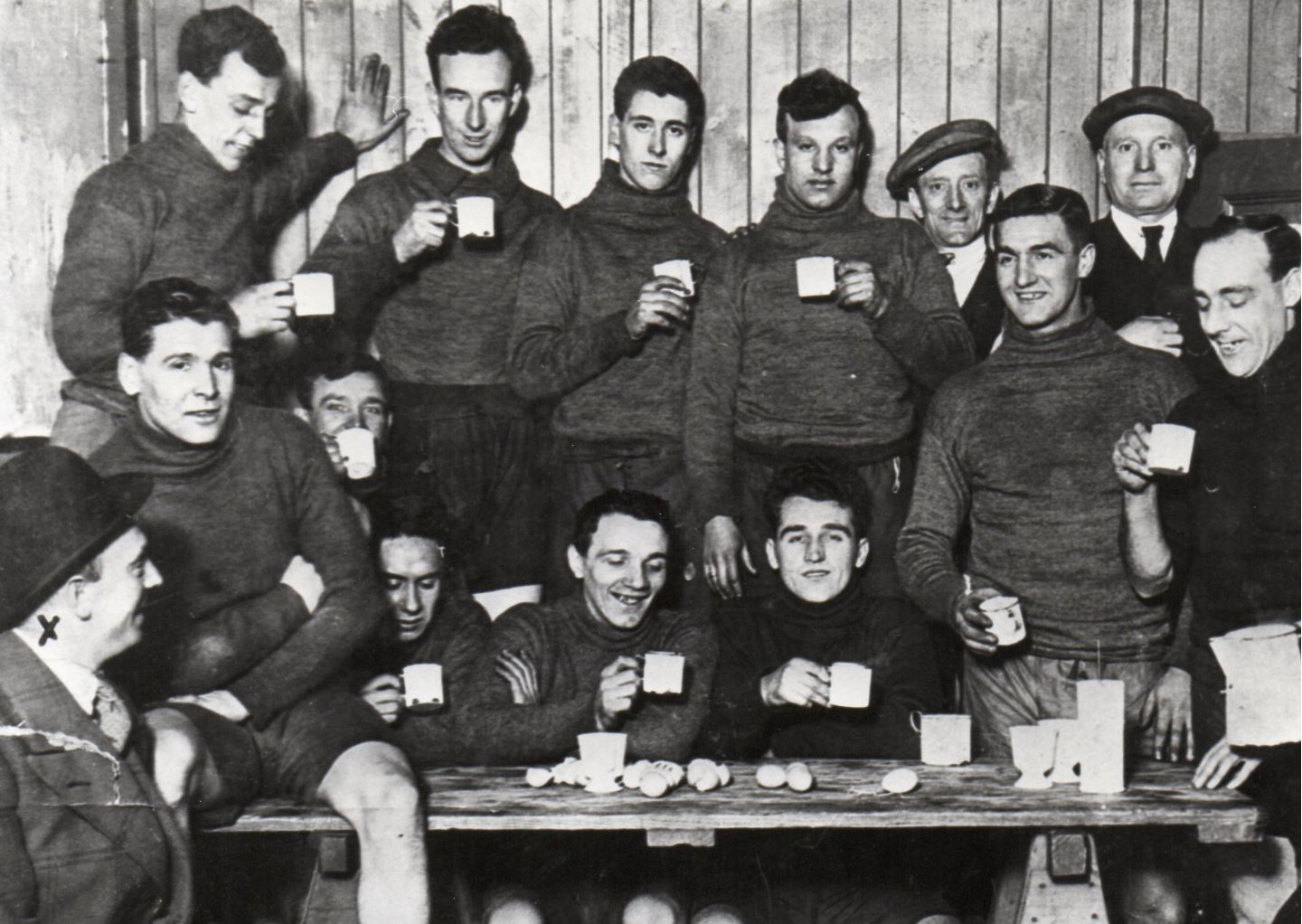
Hickling retained only five players that summer as he built a side to challenge for honours once more. The 1928-29 season would go down in the annals of Mansfield Town as the zenith of their non-league days.
In the league, they were never out of the top three and eventually won the Championship by nine points (in those days of two points for a win) and scored 132 goals in the 50 matches. The defence was, at times, suspect as they conceded 72 goals including one 11-2 aberration at Rotherham United reserves, who were, at the time, one place from the bottom of the table.
The tremendous performances in the league were, if anything, overshadowed by Town's escapades in the FA Cup!
Exempt until the fourth qualifying round, Town disposed of Ardsley Athletic to qualify for the first round proper. Shirebrook were disposed of fairly easily at that stage, and in Round Two the lads had to travel to Holker Street, the home of Third Division Barrow. Despite going a goal down, the Ambers fought back to win the tie 2-1 and beat Football League opposition for the first time.
If that tie had been a tough one, waiting in Round Three were Wolverhampton Wanderers of the Second Division, the luck of the draw again taking the Stags away from Field Mill. At Molineux that cold January afternoon, the Stags once again sent their travelling band of supporters home in a delirious state as the Wolves (including an ex-Stag in Tommy Baxter) succumbed to the only goal of the game.
Even the London press took an interest now as Mansfield were drawn to play at magnificent Highbury, home of Arsenal.
Jack Hickling was pestered by the gentlemen of the press as to how his team had achieved such success. He let slip that the players' training dietary drink of egg and milk each afternoon was the secret, which led the team to be nicknamed the 'egg and milk team'.
Many years later it transpired that this was made up purely for the press. How the players must have laughed, as they had their picture taken with their mythical elixir!
So on 26 January 1929, some 4,500 fans had the greatest day out in the club's history. The crowd of 44,925 is still one of the largest that the Stags have ever played in front of. Unfortunately, although the Stags battled well and only lost the match in the last 10 minutes when the Gunners scored twice, there was no happy ending.
The turning point came in the 33rd minute when captain Chris Staniforth missed a penalty that would have put the Stags a goal to the good. If the Stags had scored then heaven knows what would have happened. Still, those players that season had done themselves and the town proud and nothing and no one can ever take that away from them.
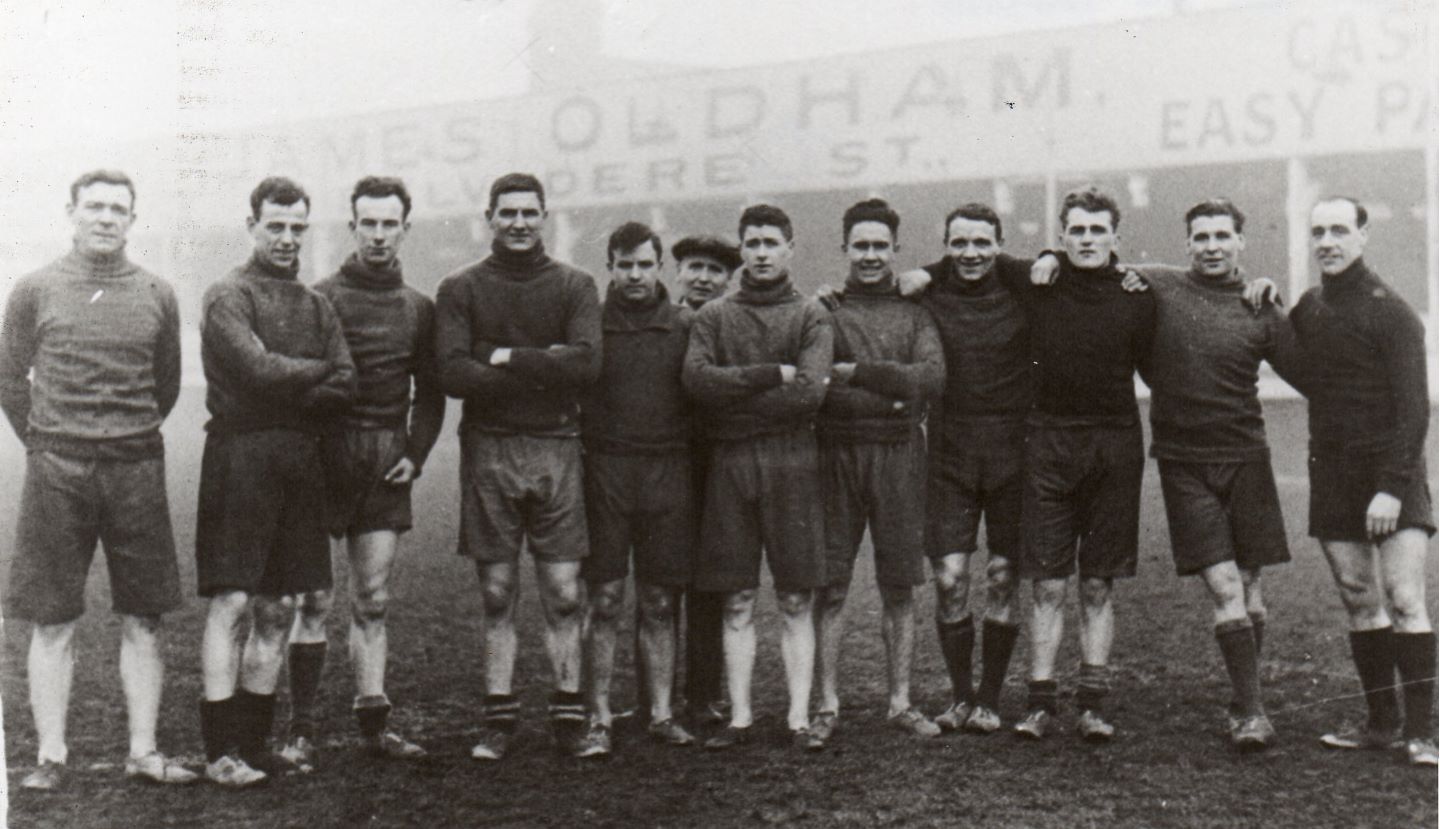
Town made another application to join the Football League that summer. Accompanying the Stags from the Midland League, in the attempt to displace Ashington and Hartlepool, this time were tenth placed York City.
This time, Town gained more votes than one of the sides applying for re-election. Unfortunately, so did York, and it was they that were elected. Just how gutted the men of Mansfield were is not reported but once again the League's voting system was shown to be woefully unfair.
But still, the Stags had taken some mighty steps in this first decade after the Great War, an excellent ground, financial security and some magnificent players - The Football League could not, surely, be far away.
The 1920s had seen the Stags take a giant leap forward, with the 1928-29 season being exceptionally successful.
As the 1929-30 season dawned, it looked as though the glory days were to continue, particularly as Town started the league programme with seven straight wins. This success could not be maintained, however, and of the next seven only one was won as the Stags had an up-and-down season. They eventually finished in a disappointing tenth position.
There was no success in the FA Cup either as, exempt until Round One, they were knocked out by now defunct Manchester Central. The usual application for Football League status was again forthcoming and once again, the Town officials left the meeting disappointed as Halifax and Barrow were re-elected, the latter collecting just seven more votes than the Stags.
The 1930-31 campaign was another topsy-turvy affair for the Stags. In the last 18 matches, 12 were lost and once again only a mid-table tenth position was achieved. There was a little more success in the cup competitions, where the Stags reached the First Round of the FA Cup and won the Notts Senior Cup.
In the FA Cup, Mansfield were exempt until the fourth qualifying round, where a team from Rotherham call Highgate were beaten by a crushing 10-1 scoreline (still the club's record FA up win). In Round One, Town visited Halifax and came away with a creditable draw, but succumbed 2-1 in the replay at Field Mill. In the Senior Cup, Notts County's reserve side were beaten 7-0 in the final on the ground of Newark Town.
In the summer, Mansfield renewed their campaign for Football League status. For months before the League's AGM, Town's officials had been canvassing for support. They also decided to change tack and apply for membership of the Southern Section of Division 3 in an attempt to win the support of the northern clubs.
The tremendous amount of work put in by all concerned paid off, as when the votes were counted, the Stags (25 votes) finished second to Norwich City (38 votes) and replaced Newport County (19 votes) in the Southern section for the 1931-32 season. At last, Mansfield Town were in with the big boys!
An amazing 23 players were signed for the new season, including 32-year-old Harry Johnson, Sheffield United's record scorer. On the League's opening day, over 12,000 spectators entered Field Mill for the historic match with Swindon Town. The Stags ran out 3-2 winners, with Joe Readman having the honour of scoring the Stags' first League goal.
On the whole, it was a difficult season, with Mansfield finishing one place (four points) away from applying for re-election. Although Johnson scored 32 goals, the defence conceded over 100 and with only five points won (no victories) away from home, it was not the start the Stags would have hoped for. There was no success in the FA Cup, as Mansfield bowed out at the first attempt away at Hull City.
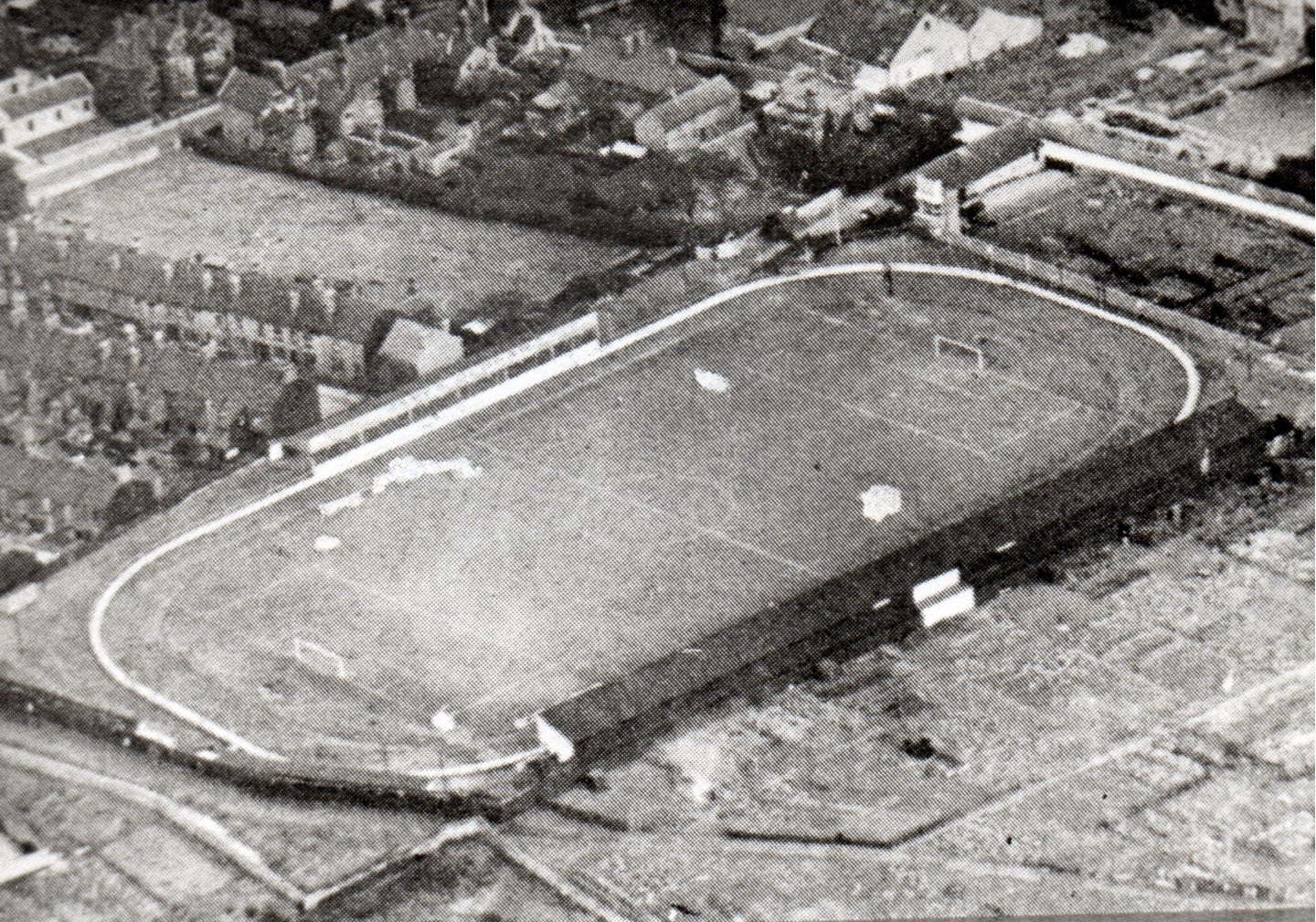
At the League's AGM, Mansfield were transferred to the Northern section to replace Wigan Borough, who had folded during the previous season. The Northern section was considered to be of a lower standard than the Southern, but the Stags did not improve much, finishing in 16th place.
Two records were set which still stand today. Rotherham United were beaten 9-2 for the record League victory, and only 23 days later, the team were beaten 8-1 at Walsall for the record defeat. The first away victory came in March, the 38th match on their travels since joining the League. Walsall also ended the Stags' FA Cup dreams in the first round, winning by a 4-1 scoreline.
In the summer of 1933, the Stags became the first club to introduce instalment payments for season tickets. Another mediocre season in the League left the Stags in 17th place. In the FA Cup, they at least this season managed a replay in the first round before losing to New Brighton in the replay at Field Mill.
The directors made a change in manager in December 1933 when they sacked Jack Hickling and installed Harry Martin in the hot seat. Harry Johnson's goalscoring prowess dimmed this season, having scored 32 in the first season and 30 the next year, this time he could only manage 18!
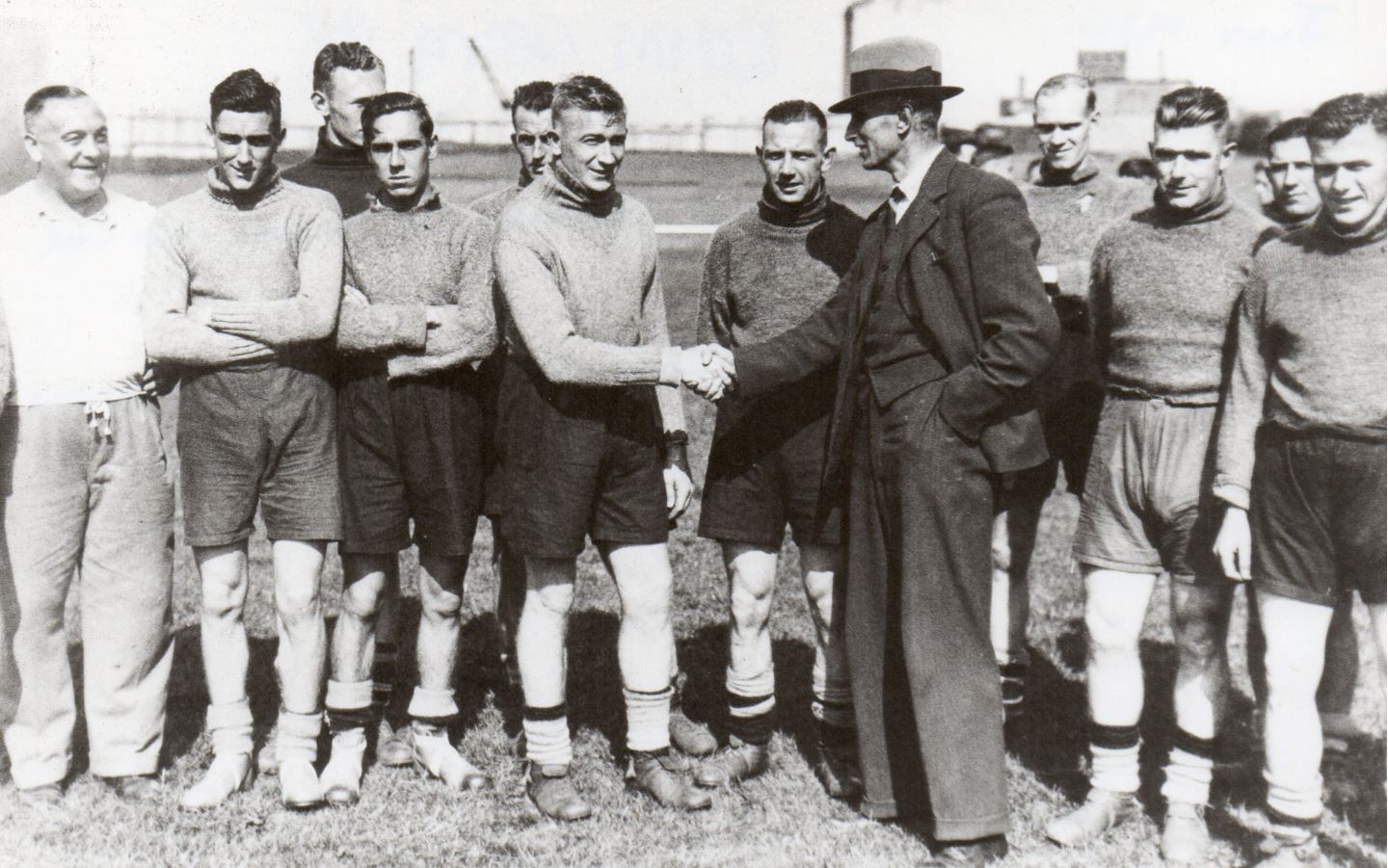
The 1934-35 season saw some improvement in the league position when, for the first time, Mansfield finished in the top half of the table - a creditable eighth place overall. There was also some improvement in the FA Cup, where the Third Round was reached. After defeating Accrington Stanley and Tranmere Rovers at Field Mill, First Division Burnley defeated the Stags 4-2 at Turf Moor.
Off-field, Harry Martin's tenure as manager ended in March, when he was surprisingly sacked and replaced by Charlie Bell. Harry Johnson scored another 17 goals to take his impressive tally to 97 in League matches.
By the end of September 1935, Harry Johnson had scored his 100th league goal for the club, but it was obvious that he was near the end of his career. Manager Charlie Bell reacted by obtaining the services of Teddy Harston from Bristol City.
He made an immediate impact by scoring a hat-trick on his debut at Southport in October. In spite of Harston's contribution of 26 goals, Town had another in-and-out finished in only 19th position. Johnson retired at season's end with a club record 104 league goals. There was another change in managership this season when Charlie Bell resigned in December.
Harry Wightman was selected by the directors as Bell's replacement, however, he took the job only until the end of the season. Another first round FA Cup defeat (2-3 at home to Hartlepool) it underlined the Stags' disappointing season on the pitch.
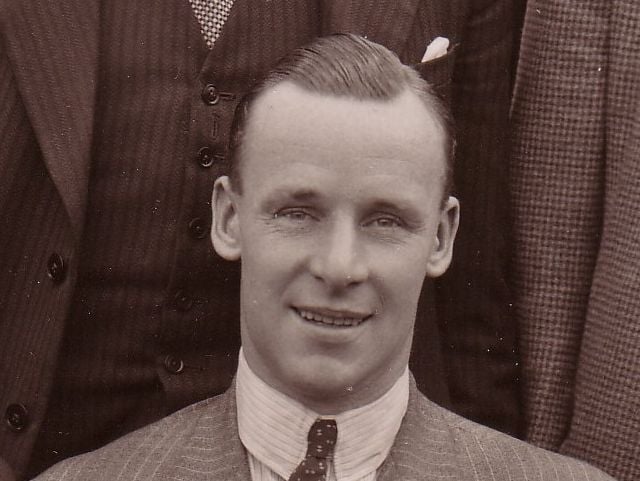
With Harry Parkes in place as the new manager, there was plenty of excitement on the pitch as the Stags climbed into ninth position. This would, no doubt, have been much better had there been more support for Teddy Harston, who excelled by scoring an amazing 55 goals in 41 league games.
His incredible haul included one seven, two fives, a four and three hat-tricks. For good measure, he notched another treble in the FA Cup as the Stags reached the second round. The Notts FA also introduced the County Cup for the first time this season. Unlike today, the major non-league side were invited to participate to make up the four for the semi finals.
The Stags made an inauspicious start in the competition, losing 5-1 to Notts County. Unsurprisingly, Town accepted Liverpool's offer for the hit man and he joined the Reds for the start of the new season. Harry Crawshaw came to Field Mill as a replacement. Town were also transferred into the Southern Section for the 1937-38 season
Although the new striker emulated Harston by scoring a hat trick on his debut, and his 25 goals in the 1937-38 season made him the Southern Section's leading marksman, Mansfield could only manage a below-par 14th place.
In the FA Cup, the Stags were quite successful in reaching Round Three, where after disposing of Wellington Town and Lincoln City, First Division Leicester City proved too strong and won 2-1 in front of a new record crowd (15,890) at Field Mill.
Town did capture some silverware though when, after defeating Newark Town in the semi final, Nottingham Forest were beaten 2-1 in the final of the County Cup. In January 1938, the merry-go-round in the manager's office continued as Harry Parkes left the club to be replaced by Jack Poole.
In the summer of 1938, Harry Crawshaw left Field Mill for Nottingham Forest - a move which left the Stags short up front in the following season. The Stags finished 16th in 1938-39. The 'goals for' tally of 44 showed exactly what the problem was - the leading scorer this time was Dutton with 12.
In the FA Cup, the Stags reached Round Two, defeating Workington in the first round before losing to Halifax Town at Old Trafford in a second replay in that second round. In the County Cup, Mansfield again reached the final where they drew 2-2 with Nottingham Forest.
Due to the outbreak of the second world war, the match was never replayed and the competition remained in abeyance until the 1960s.
In spite of the very real threat of war, preparations for the 1939-40 season went ahead as usual.
The Football League began on 26 August with the Stags losing 5-4 at home to Crystal Palace. Two more matches were played (a 2-1 win at Watford and a 2-2 draw at Torquay) before Mr Chamberlain's radio broadcast on Sunday 03 September that declared 'consequently this country is at war with Germany'.
In contrast to WW1, the Football League cancelled its programme for the duration of WW2 and the government announced a ban on the assembly of crowds until further notice. This ban did not last long, following the realisation that the threat of air raids was not as bad as first suspected and a maximum attendance limit was imposed.
By October, the Football League had organised regional competitions where clubs from all standards were grouped together. The rules regarding registration of players were relaxed, so clubs in the proximity of bases for the forces relished this - Aldershot were able to turn out almost an English international XI! For the record, the Stags' first fixture was away at First Division Grimsby Town, and they lost 2-1.
Incidentally, one of the Mariners' goal scorers was Ted Roberts (a guest player from Coventry City) father of Dudley Roberts, a famous striker for the Stags 30 years in the future. The side, unsurprisingly, was unsettled throughout the season, but Mansfield still managed a creditable fifth place in the table out of the 11 participating teams.
For the 1940-41 season, the leagues were rearranged and Mansfield were included in the South Regional League. As travelling was restricted, all teams could not play every other, and so the number of matches played by every team was not equal. Therefore, league position was determined by goal average (goals for divided by goals against).
The Stags finished in 17th place out of 34 with a goal average of 1.132, having scored 77 and conceded 68 goals in their 29 matches. 'Tex' Rickards led the way, netting 38 of the goals, including a hat-trick in just three-and-a-half minutes in the 6-2 picking of West Brom.
The following season, the Stags joined 37 other clubs in the Football League North. In the first instalment of the competition, Mansfield finished in a miserable 33rd place. In the secondary competition, they were even worse, finishing in 50th place out of the 51 competing. Seven qualifying matches were played in the League Cup (a league competition, not a knockout). The Stags did not qualify for the later stages.
The 1942-43 season was even more of a disaster, with Mansfield finishing bottom of the table in the first competition. There was no improvement at all in the second competition, where another bottom place was secured.
Once again, they failed to qualify for the later stages of the cup competition, finishing two off the bottom in the table. Somehow Middlesbrough and Oldham managed to finish lower than the dreadful Stags. In January, Selby Musgrave, the club secretary, died. He was replaced by Herbert N Mee, the famous football referee.
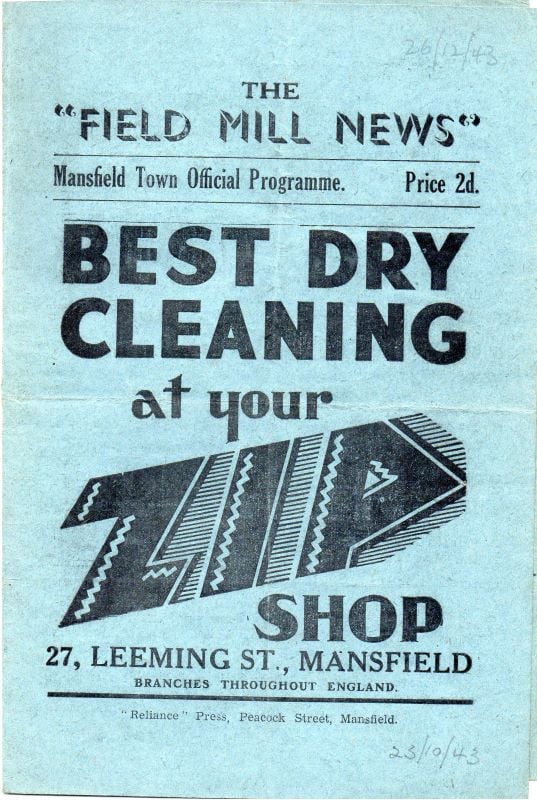
There was some improvement in 1943-44, with a final placing in the first competition of 18th out of 50 entrants. This improvement turned out to be temporary as Mansfield slumped to 47th out of 50 for the second competition.
Once again, there was no progress from the qualifying competition of the League Cup. In July 1944, the team manager, Jack Poole, announced his resignation to take up the position of trainer at Notts County. Current first team captain Lloyd Barke took up his duties for the following season.
With Barke in charge, Mansfield ended the first competition in 38th place. It is interesting to note that Nottingham Forest finished 39th and Notts County bottom of the lot in 54th place. The second competition was more of a struggle as the Stags dropped to 55th out of the 60 competing teams this time round. Forest overtook the Stags this time but County managed only 59th place.
The Stags got no further than the qualifying competition of the war time cup. In May 1945, the former English international player Roy Goodall was appointed as manager/secretary, as Lloyd Barke's tenure in the job expired.
By the time the 1945-46 season got under way, the war had been won. However, with so many players still in the services, league matches were still played on the regionalised basis.
There were changes, though. The old Third Division North and South were reformed from the 1939 standings. The Stags therefore played in the southern section, which was itself divided into north and south sections because of travelling restrictions.
The first half of the season comprised the league matches, the Stags won only three out of the 20 and so became wooden spoonists. In the second competition, which was the qualifying competition for the Division 3 South Cup, Mansfield finished third, but did not qualify for the semi-finals as only the top two teams from each section went through. There was some semblance of the returning normality when the FA Cup was resumed.
For this season only, all ties up to the semi-final stages were played on a home and away basis. In the first two rounds, the Stags were paired with non league opposition, firstly Gainsborough Trinity were beaten 5-4 on aggregate (extra time was required in the second leg) and then Grantham lost 3-2 on aggregate in the second.
In the third round, Sheffield Wednesday drew a crowd of over 9,000 to Field Mill for a 0-0 draw. Over 22,000 turned up at Hillsborough for the second leg to see the Owls triumph by five goals to nil.
So the war was over, and for 1946-47, the Football League would restart with the Stags in the Southern Section of Division Three. The same fixture list was used as had been drawn up for the aborted 1939-40 season. The first three matches were far more fruitful than those of seven years before as Mansfield won the first two versus Crystal Palace and Watford and then drew with Torquay.
From then on in, it was downhill all the way, as Town performed terribly and finished bottom of the division, below Norwich City on goal average. At the Football League's AGM, the Stags sought re-election, however, it was proposed that as this was the first season after the war and with so many players still in the services, that all four clubs seeking re-election should be returned unopposed without putting the matter to a vote.
This proposal was passed and the Stags lived to fight another day, although at the meeting they were transferred into the Northern Section. There was no FA Cup success either as Northampton were triumphant in the first round tie at the County Ground.
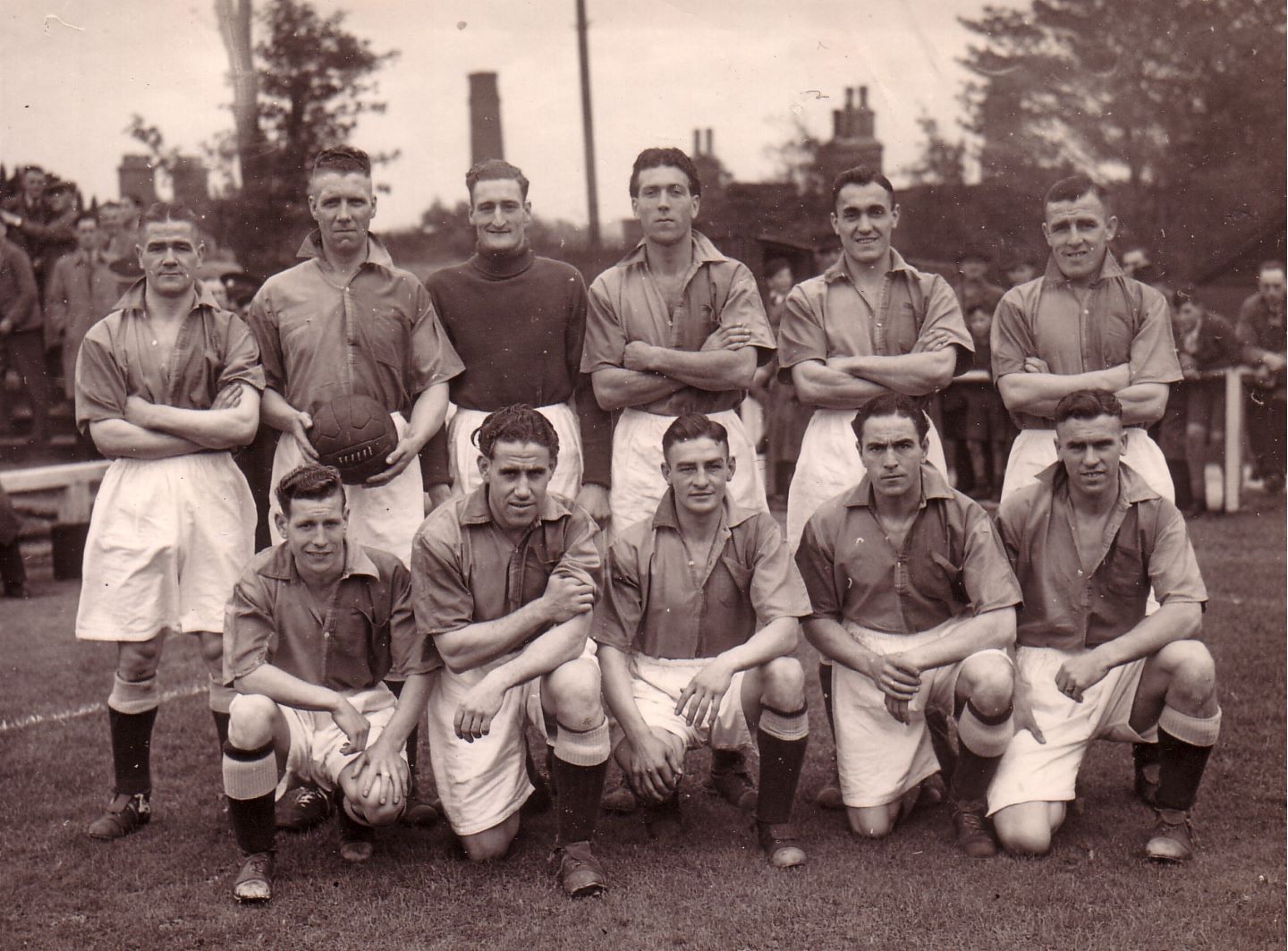
Back in what was traditionally thought to be the weaker of the two regional sections of the third division, the Stags fared particularly better than the previous term, finishing in a comfortable eighth place. There was also some excitement in the FA Cup as the Stags reached the Third Round, disposing of Wimbledon (then a non league outfit) and Oldham in the earlier rounds.
Both were beaten by the only goal on their own grounds. In round three, Stoke City were the visitors to Field Mill and they took the honours from a 4-2 scoreline. In common with most clubs, the Stags' average attendances reached record proportions in what has become known as the 'post war boom.' This term, an average of 11,545 went through the turnstiles for each home game, the best being the 18,863 who attended Field Mill for the visit on Lincoln City.
There was no improvement on the pitch in the 1948-49 campaign, as Mansfield managed a mid-table position all season to finish in a no more than respectable 10th position. Once again, the third round of the FA Cup was reached. Gloucester City (4-0) and Northampton Town (2-1) were beaten in the first and second rounds, respectively.
The third round brought an exciting tie at Deepdale against Preston North End, Tom Finney and all. In front of a crowd of 33,000, the Stags were a little unfortunate to go down by the odd goal in three. League attendances were on a par with the previous year as the average once again surpassed 11,000, 11,292 to be exact.
Doncaster Rovers proved to be the most popular visitors with 16,749 attending the opening match of the season.
After the struggle of war, during which one Stag (Ivan Flowers) lost his life, the return to peace had seen the Stags return to some semblance of normality, and with the crowds on the up, the club could look to the future with some optimism.
The Stags' preparations for the move into the new decade received a shock in mid-August 1949 as manager Roy Goodall resigned.
No reason was given, but shortly afterwards he moved back to his former club, Huddersfield Town, in a senior coaching capacity. In his place came former England international forward Freddie Steele from Stoke City. Although aged 33, he came in as player-manager.
Mansfield started the season in terrific form, not being defeated until their 11th game. New manager Steele scored on seven occasions during this run of six wins and four draws. This proved to be the high point of the season as from then on in, there was no real consistency, although a run of six straight wins in March and April no doubt ensured the final eighth placing in the table.
Steele finished as leading scorer with 18 goals from the 22 matches he played in. The Stags were not so successful in the FA Cup this time, as old rivals Doncaster Rovers ended the run in round two.
Walsall were defeated in the first tie. An all-time record high average attendance of 12,128 was set for League matches during this season, and unless One Call Stadium is further redeveloped, this record - which has now stood for over 50 years - will not be broken. The season's best attendance of 19,466 for the League game with Doncaster is still the second best League attendance of all time at One Call Stadium.
Amongst Mansfield's older supporters, the 1950-51 season is remembered as the club's best ever. It was certainly at the time the zenith of the Stags' achievements since attaining Football League status some 20 years or so before with major success in both league and cup.
The season began with a five match unbeaten run (three wins, two draws) before the first defeat at eventual champions Rotherham. There were only three more defeats before Christmas and the New Year arrived with Mansfield in fifth place. The team held their own in January and February before winning seven out of the eight matches played in March and moving into third place in the table.
There were now just nine matches until the end of the season, but five draws and four wins were not enough to topple Rotherham from the top, so the Stags had to settle for second place. Despite their best season to date, only one team would be promoted, and it was the Yorkshiremen who went up, leaving the Stags in the Third Division. Still, Mansfield were unbeaten at Field Mill all season (the first team to achieve this from a 23 match home schedule). Perhaps surprisingly, the average attendance dropped this season to 10,262, Rotherham being the most popular visitors (in the League) attracting over 18,000 paying customers.
There was more excitement in the FA Cup where the Stags excelled themselves with their best run since the heady days of 1929. Famous amateur club Walthamstowe Avenue came to Field Mill in Round One and were beaten by the only goal in a hard fought match. More non-league opposition were dispatched in round two as Mansfield won 4-1 at Chelmsford City. Second Division Swansea Town came to Field Mill for round three, and they too bit the dust as the Stags turned in another exceptional display, winning by two goals to nil.
Mansfield drew a 48,696 crowd to Bramall Lane in round four and once again excelled themselves, bringing their Second Division opponents back to Mansfield for a replay following a 0-0 draw. A new cup record gate of 20,314 turned up at Field Mill the following Wednesday afternoon to see the Stags triumph by the odd goal in three after dropping a goal behind to the Blades.
In the draw for round five, the Stags were drawn to play away again, this time at First Division Blackpool, Stanley Matthews and all. This time, however, the Stags disappointed and never really got going, losing eventually by a 2-0 scoreline. The match itself was not a classic. Blackpool eventually reached Wembley that season, but were not good enough in the final, losing to Newcastle United by two Jackie Milburn goals to nothing.
Following the euphoria of the previous season it was hoped that Mansfield could go one better in 1951-52 and attain Second Division status at last. In spite of a reasonable start to the season (only three matches were lost before the end of November), the Stags faded and never really challenged for honours after that, finishing in sixth place.
There was no cup success this season either, as Mansfield battled out a 1-1 draw with Stockton in the north east and then lost the replay 2-0 at Field Mill to be dumped out in the first round. There was more fun and games off the pitch, as Freddie Steele resigned as manager a few days before Christmas to take up a similar position at Port Vale.
Sensationally, Mansfield's directors replaced Steele with George Jobey, 66-year-old former Derby County manager, a man who had been suspended by the FA for making illegal payments to players a few years before. Secretary Bert Mee had also resigned in November to be replaced by WJ Warner.
The Stags started 1952-53 in reasonable form - there were only five defeats before the Christmas period, but over the festivities a run of five successive defeats put paid to any thought of success for the season. In fact, it was February before Mansfield won again, by which time the supporters were looking at the bottom of the table rather than the top. The team rallied towards the end of the season, finishing in a very poor 18th place in the table.
There was some success in the cup as Town humiliated Scarborough by eight clear goals to nil at their own stadium in the first round. In round two, another away game resulted in victory when the Stags won 2-0 at Peel Park, the home of Accrington Stanley. Round three brought a home tie at last and visitors Nottingham Forest attracted an all-time record gate to Field Mill. A total of 24,467 spectators witnessed a very good game of football, but unfortunately, the visitors took the honours by the only goal of the game.
Once again, there were problems off the pitch. Secretary WJ Warner was sacked in December and it was announced that the club's finances were being investigated by the police. In fact, by the time of the club's AGM in the following month, the books weren't available as the police still held them. It was stated at the meeting that the club was close to bankruptcy and the meeting was adjourned. In February, chairman Bill Hornby and vice chairman Merle Smith resigned from the board. At the end of the month, Mansfield Magistrates committed Warner for trial, charged with theft and fraud to the tune of £2,344.
The AGM was reconvened in March where it was revealed that the club had only £44 to meet the wage bill of £360. The AGM resumed again in April and JB Jenkins was elected chairman with six new directors, this time it was revealed that the club had debts of around £14,000 and was close to folding. Nottingham Forest sent their full strength team to play a friendly match to help raise funds - the match brought in £360 1s 9d.
The close season brought more fun and games as firstly in May, George Jobey was sacked from his position as manager and then in July the trial of former secretary, Warner, began. He was cleared of the fraud and theft charges, but convicted of falsifying the PAYE returns and fined £75. Warner's defence was that he was covering up for then-manager Freddie Steele's illegal payments to players. Assistant manager/secretary Stan Mercer was offered and accepted the manager's job in August. Joe Eaton started his very long term in the secretary's position at this time.
The 1953-54 season started with the Stags in very indifferent form, languishing in the lower half of the league. Things slowly improved - there were two 6-0 wins in December, and eventually Mansfield finished in a very credible seventh place. Hartlepool put paid to any thoughts of a lucrative cup run, winning a first round replay 3-0 at Field Mill. Off the field, the club's financial problems had eased somewhat. The appeal fund, started the previous April, had raised over £4,000 and the sale of Billy Coole to Notts County had raised a further £6,000. The professional staff had been reduced from 33 to 24, reducing the running costs by £50 per week. McGregor had arrived from Leicester City for a fee of £25,000 but the Filberts had very generously allowed the fee to be paid in instalments over a 12 month period.
In October, the fourth AGM of the year revealed that the club's debts had been reduced to £6,149. In December, a joint FA/FL commission met at the Victoria Hotel in Nottingham to discuss matters arising from the Warner trial. The outcome was that several former officials and players of the club were fined and/or suspended from football. The club itself was fined £500 plus the costs of the commission, which added to the clubs already precarious financial position.
The 1954-55 season was not a resounding success by any standards, but this is probably understandable given the financial position the club found itself in. A 13th-place finish in the final standings followed from an average season. The FA Cup provided no solace either, as Bradford City triumphed on their own ground in round one.
In spite of appointing the club's first ever coach (Sam Weaver) in September, Mansfield were languishing in the lower reaches of the division by January 1956, having managed only a handful of victories.
After a 7-2 defeat at Stockport County and being asked to undertake more duties with no increase in pay, manager Stan Mercer resigned. Stags' directors reacted by appointing a 'big' name to the post, when in February Charlie Mitten came to Field Mill as player/manager.
From this point on, performances improved and in the end, Mansfield were able to complete the season in 18th place. Only round two was reached in the FA Cup - Stockport were the victims in round one and York City took the honours in round two. At the end of the season, Uruguayan side Rampala came to Field Mill to provide very attractive opposition for a friendly match, and the visitors won a very entertaining game by the odd goal in seven.
The 1956-57 season followed a very similar pattern to the previous campaign, a late season rally giving the Stags a final league placing of 16th. Workington came to Field Mill for a first round FA Cup replay and won by two goals to one, so there was nothing to write home about in the cup ties either. Foreign opposition once again turned up at Field Mill for an end of season friendly, when German side Blauweiss were beaten 3-1. At the end of the season, the appearance of the Field Mill ground started to change with the construction of the new North Stand at the railway end of the ground.
There was much to play for during the 1957-58 season, as the Football League decided at the AGM that the regionalised Third Division would be reconstituted at the end of the season with the top 12 clubs from each section forming the new Third Division, with the rest making up Division Four.
The new season proved to be very entertaining for the fans, as Charlie Mitten's side scored goals galore, hitting the net an incredible 100 times in League matches alone. This ensured that Town would be in the newly created Division Three for the next season. However, the 92 goals conceded contributed to a final sixth place in the table. Town were defeated heavily 5-0 in the third round of the FA Cup by Bristol Rovers. Halifax Town and non-league Wigan Athletic had been dispatched in the earlier rounds of the competition.
Once again, there were backroom changes when manager Charlie Mitten left the club in June to become manager of Newcastle United. In a biography written in 1996 Mitten stated: "The Mansfield job was the best I ever had in football."
He is also quoted as saying: "The big and pleasant surprise was the backing I got from the supporters' club. Their amazing fundraising efforts allowed me to finance some astute purchases".
With Sam Weaver now taking Mitten's place at the helm, Southampton were Mansfield's first opponents of the new 1958-59 season. The match, at Field Mill, was an absolute disaster for Town as the visitors ran out easy 6-1 winners. Right-back Hogg and centre-half Billington made their only appearances for the Stags in this match.
Worse than this was the 8-3 debacle at Home Park, Plymouth, later in the season. The whole season was a bit of a struggle and at the end relegation was avoided, but only just as the club finished in 20th position. Bradford City ended any hope of cup tie success, winning 4-3 at Field Mill in round one of the FA Cup.
The 1950s were certainly times of turmoil both on and off the pitch, the league and cup success of Freddie Steele's side being closely followed by the near financial collapse caused by the 'Warner' case. But the club had survived and were now, if only just, in the Third Division. What surprises would the 1960s hold?
Having just avoided relegation in 1958-59, worse was to follow in 1959-60 as the Stags were relegated for the first time since joining the Football League.
The Stags had an appalling start to the season and won just one of their first 13 games to leave themselves rooted to the bottom of the table. Their first home victory came in a 4-3 win over QPR on 10 October. A general improvement in form followed and included a 6-2 win over Wrexham at Field Mill but, following a 5-1 defeat at home to Bury, and with Stags still sitting bottom of the table in mid-January, manager Sam Weaver was asked to resign.
Two weeks later, Raich Carter, a former England international, who had previously managed Hull and Leeds, was appointed the new manager. There was an improvement in form and Stags ended the season winning a total of 11 home games, but defeat in three of the final four games of the season saw them relegated in 22nd place out of 24 clubs. Stags fared a little better in the FA Cup, beating Accrington Stanley and Chester before losing at First Division Blackpool in the third round, in front of nearly 19,000 fans.
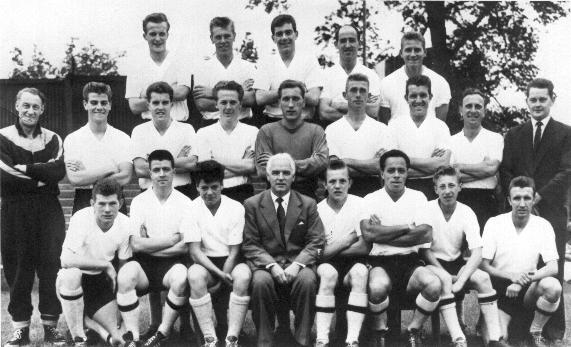 So the Stags started 1960-61 in Division Four, but once again got off to a poor start, failing to win the opening three games. But victory in the fourth game away to Rochdale was significant, as 17-year-old Ken Wagstaff, who had signed from Langwith Woodland Imps, made his debut and scored both goals in a 2-1 win.
So the Stags started 1960-61 in Division Four, but once again got off to a poor start, failing to win the opening three games. But victory in the fourth game away to Rochdale was significant, as 17-year-old Ken Wagstaff, who had signed from Langwith Woodland Imps, made his debut and scored both goals in a 2-1 win.
By mid-December, Stags were hovering around the bottom four spots of the table, though wins over Aldershot and Hartlepool either side of Christmas improved the situation.
New signing Jimmy Gauld scored in both games but broke his leg in the latter fixture. Gauld was to hit the headlines later for his part in a soccer betting scandal, where he had developed a betting syndicate whilst recovering from his broken leg.
In the next eight games, seven were lost and one drawn to push the Stags into the bottom two. But a crucial run of three consecutive victories followed with Doug Wragg and Ivan Hollett, who ended the season as the two leading goalscorers, scoring the decisive goals. These results pulled the Stags out of the bottom two and for the rest of the season with the odd game won and the odd game drawn, Stags managed to finish fifth from the bottom and hence outside the bottom four, though only on goal average above Exeter City.
Therefore, Stags marginally avoided having to apply for re-election. In the FA Cup, Stags lost in the second round to Accrington Stanley after having beaten Blyth Spartans in the first. It was the first season of the Football League Cup, and Stags lost in the first round to Leicester City. Also, the Notts FA County Cup restarted for the first time since the war, as Stags lost 1-0 to Nottingham Forest.
During the close season in 1961, the Supporters Club paid £10,000 to buy the grandstand from the Hurst Park racecourse in Surrey. It was estimated that the total cost once transported and re-erected would be about £30,000. The intention was for it to become the West Stand. However, after the components lay for several years next to the ground, it was not until 1966 that the stand was first used, and it was not until 1971 that it was fully seated. The final cost reached £200,000 - more than six times the original estimate.
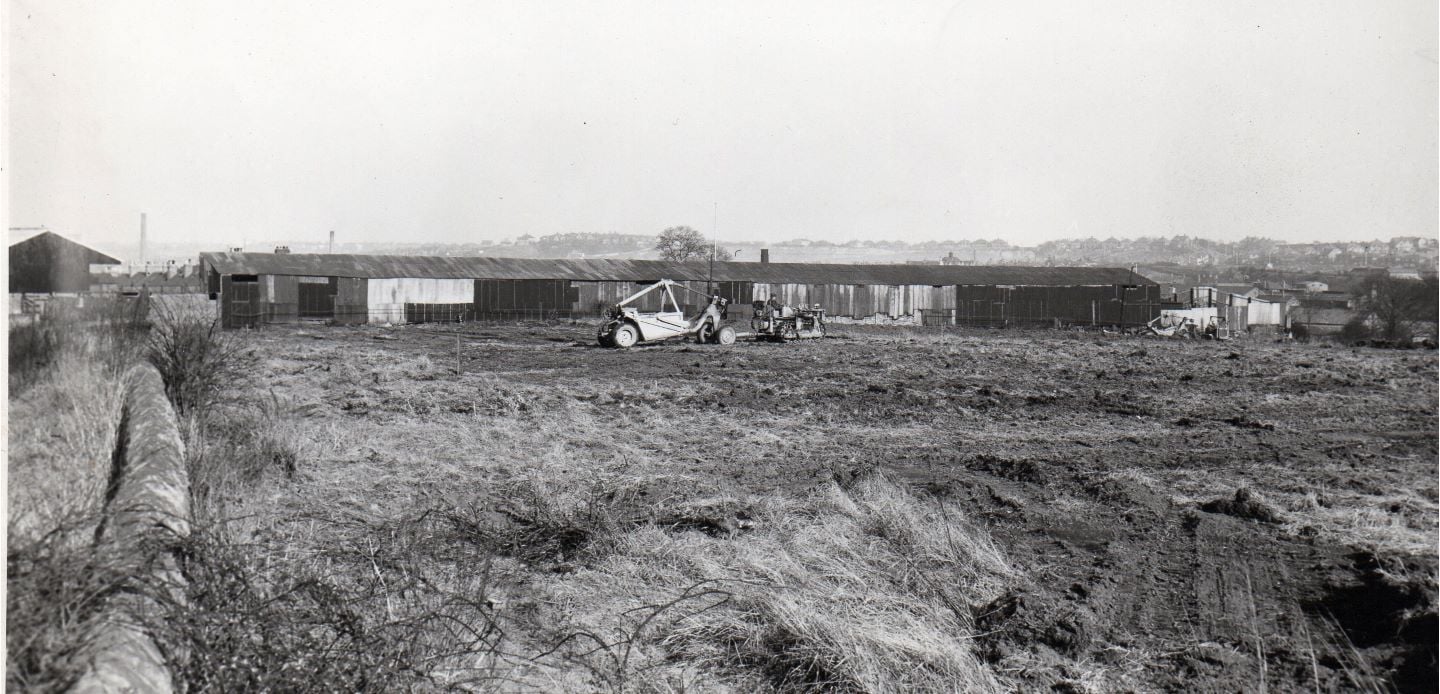
At the start of the 1961-62 season, Stags reverted from a strip of white shirts and black shorts that had been used for seven years, to the more accepted colours of amber shirts and blue shorts.
Stags got off to a better start with victory in the opening game of the season over Exeter City. After defeat in the second game, Raich Carter paid a club record fee of £10,000 for Roy Chapman from Lincoln City. Chapman, father of Lee Chapman, was an instant success, scoring 20 goals in the season. With young strike partner Ken Wagstaff netting 12, Stags finished the season with 44 points from 44 games for a mid-table position. In the FA Cup, Stags were again knocked out in the second round, this time by Southport after having beaten Grimsby Town in the first round. In the League Cup, Stags beat Exeter 5-2 in the first round and were drawn at home to First Division Cardiff in the second round. The game was to be the first at Field Mill to be played under the newly installed floodlights on 05 October 1961, and attracted a huge crowd of 17,380. A thrilling game ended 1-1 with Mike Stringfellow scoring for the Stags. Stags lost the replay 2-1 in Cardiff.
 The 1962-63 season was a hugely exciting one as the Stags were promoted on goal average by 0.118 of a goal. Stags got off to a tremendous start by winning their opening six Division Four games of the season and being unbeaten in the opening 10 games.
The 1962-63 season was a hugely exciting one as the Stags were promoted on goal average by 0.118 of a goal. Stags got off to a tremendous start by winning their opening six Division Four games of the season and being unbeaten in the opening 10 games.
By the beginning of December, Stags had been caught by Oldham but were still top of the league on goal average with 21 games having been played. Raich Carter resigned as manager in January to become manager at Middlesborough, but he had already done enough in assembling a team with talented youngsters such as Wagstaff, Stringfellow and Peter Morris.
New manager Tommy Cummings was appointed in March. As the season progressed, the Stags slowly dropped down the table and hovered around fourth or fifth place (with four teams to be promoted). And so it came down to the final game of the season on 20 May 1963. Stags were sitting in fourth place but were just a point ahead of Gillingham.
Stags' final game was away to Stockport County whilst Gillingham were at home to Oxford, but, in a situation which would not be allowed to happen today, the Gillingham match kicked off an hour before Mansfield's game. At half-time there were no goals at Stockport, but the news came through that Gillingham had beaten Oxford 2-1. Stags knew that a draw would be good enough to achieve promotion on goal average. Stockport took the lead after 54 minutes, but Town got the all important equaliser after 64 minutes from Sammy Chapman after a crisp pass by Ken Wagstaff cut open the way. Stags comfortably held on to get a 1-1 draw. And so Stags made it . by a little more than a tenth of a goal. Stags' goal average was finally 1.567, Gillingham's was 1.449.
The season also featured a remarkable FA Cup run, which included a 9-2 first round replay win over amateurs Hounslow Town at Field Mill after a 3-3 draw at Hounslow. Then a 2-2 draw in the second round away to Crystal Palace in which ten Stags' players were booked by the referee for 'ironically applauding' him off the field (still a record in this country), after the man in the middle had awarded a controversial penalty in the last few minutes.
This was followed by a 7-2 win for Stags in the replay over Palace at Field Mill, including a Ken Wagstaff hat-trick. But the Stags were beaten by First Division Ipswich in the third round, 3-2 at Field Mill. The season was a triumph for strikers Wagstaff and Roy Chapman, who knocked in 41 and 37 goals respectively.
No side in the league has had two players to each score 30 league goals in a season since this. The average home attendance of 9,848 was the best since 1950-51. In early May 1963, Stags' captain Brian Phillips was named in The People newspaper as having been involved in a match-fixing scandal, and was immediately suspended by the club, thus missing the exciting run-in to promotion. The story was later to escalate into what The People called the biggest soccer scandal of the century.'
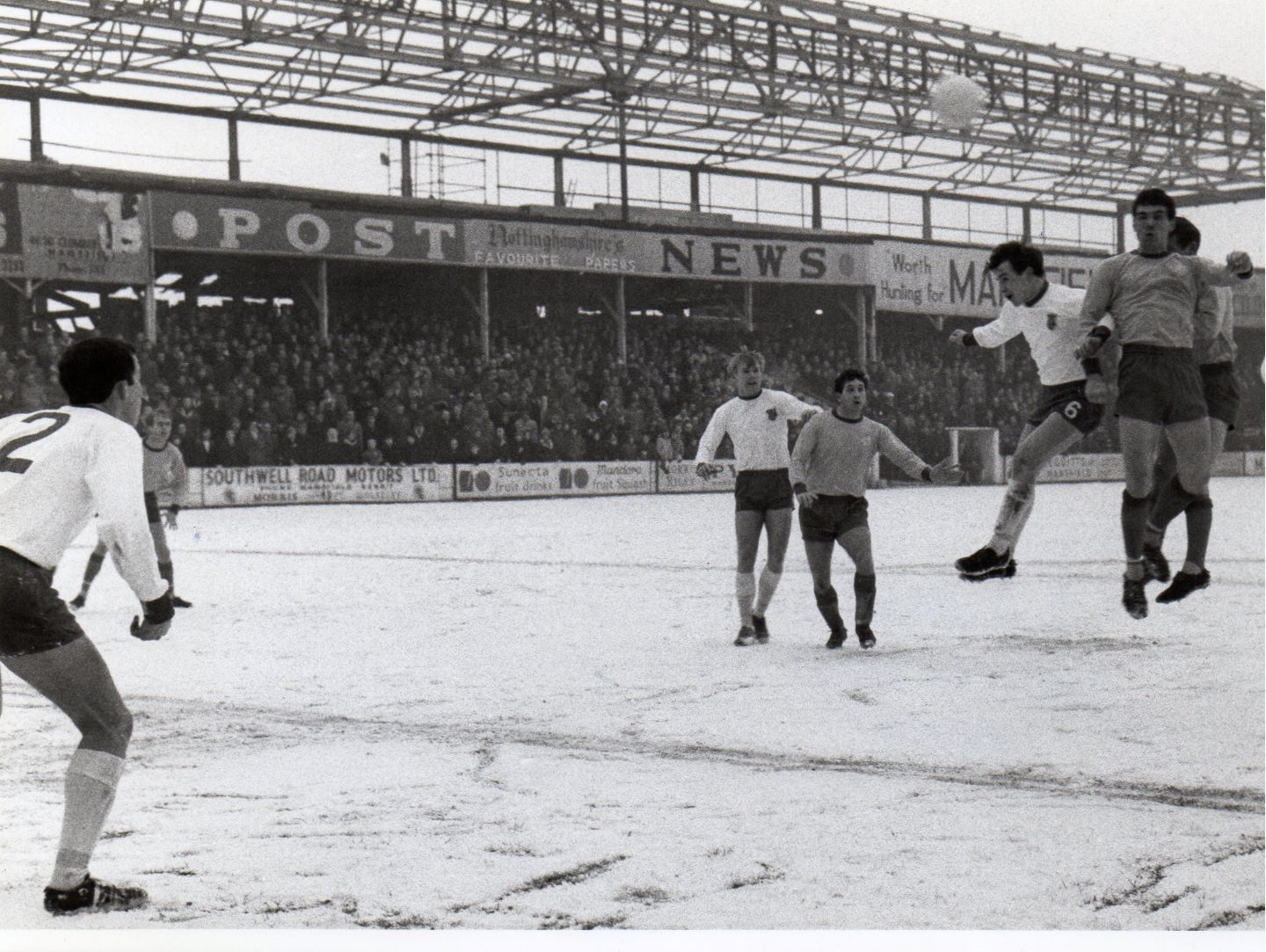
Stags were back in the Third Division for the 1963-64 season. The season was to be another major success for Ken Wagstaff and Roy Chapman, as Wagstaff smashed in another 29 goals and Roy Chapman 20. Stags finished a very creditable seventh, nine points behind promotion to the Second Division.
The season was built around an impressive unbeaten home record with 15 wins and eight draws, though the season ended with the backdrop of the football scandals in The People newspaper continuing as 24 hours after the final match of the season. Five Stags' players were named as having provided money to fix a win at Hartlepool the previous season. As a result, Stags' skipper Sammy Chapman was suspended by the club whilst Jimmy Gauld was given a life suspension by the Football League the following month. In the League Cup, Stags lost 5-1 at Leeds in the second round after having beaten Watford in the first round.
Stags started the 1964-65 season in entertaining fashion with several high scoring games and by mid-November were fifth in the table, when popular striker Ken Wagstaff was sold to fellow Third Division club Hull City for a club record £40,000.
Whilst it was inevitable that the prolific Wagstaff would leave Field Mill, it was something of a surprise that he joined another Third Division club. Then Roy Chapman left for Lincoln City in January. Nevertheless, Stags' form even improved a little with the goals from Bill Curry, who joined from Derby County in February, ending the season with 15 goals from 16 games, and Harry Middleton, who joined in November from Shrewsbury, scoring 16 goals from 24 games.
There were some hugely impressive wins such as an 8-1 victory over QPR, with hat-tricks by both Curry and Middleton, as Stags chalked up the second biggest win in their history, and 6-1 over Southend with Curry netting four.
After the Stags beat leaders Carlisle United 2-0 at Field Mill on Easter Monday, Stags were sitting second in the table (with two teams to be promoted) and with just two games to go. The Stags were a point behind the leaders and two points ahead of third-placed Bristol City. The following day, Stags travelled to leaders Carlisle for the return match, when victory could have seen Mansfield go a long way to lifting the title.
But in a nightmare first half, Carlisle scored three times to eventually win 3-0. Meanwhile, Bristol City were winning. So Bristol City moved into second place on goal average, which was the equivalent of about six goals better than the Stags.
And so it came to the final day of the season. Stags won their final match 3-2 at Barnsley, and a story spread round the Oakwell ground at the end of the game that Bristol City had dropped a point. Stags' fans went wild with excitement, but soon the news came through that in fact the real result was a 2-0 win for Bristol City. As the excitement of supporters and players evaporated, manager Tommy Cummings philosophically stated: "We hope to go one better next year."
So, the Stags finished in third place and missed promotion by virtue of having a goal average of 1.56 compared to Bristol City's 1.67. Meanwhile, in the League Cup, Stags won 5-3 at Manchester City before losing 3-2 to Coventry City.
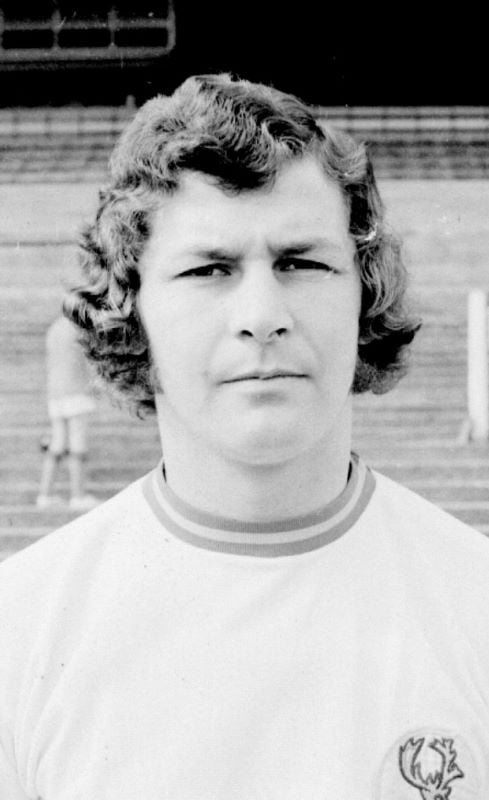 The soccer betting scandal continued during the season and at the end of January 1965, Jimmy Gauld, who had been identified as the ringleader of the match-fixing syndicate after admitting that between November 1961 and April 1963 he had been grossing £1,000 a week from the match-fixing fraud, was sentenced to four years imprisonment. Two other Stags' players were imprisoned: Brian Phillips for 15 months and Sammy Chapman for six months. Seven players from other clubs were also sentenced to imprisonment.
The soccer betting scandal continued during the season and at the end of January 1965, Jimmy Gauld, who had been identified as the ringleader of the match-fixing syndicate after admitting that between November 1961 and April 1963 he had been grossing £1,000 a week from the match-fixing fraud, was sentenced to four years imprisonment. Two other Stags' players were imprisoned: Brian Phillips for 15 months and Sammy Chapman for six months. Seven players from other clubs were also sentenced to imprisonment.
The 1965-66 season promised a lot after just missing out on promotion the previous term, and Stags won the first four games to put themselves on the top of the pile with Bill Curry netting five goals.
But a terrible run of form followed and only two further games were won before February 1966, by which time Stags had sunk to second bottom. Three wins in the final five games of the season enabled Stags to pull away from the relegation zone and finish sixth-bottom, two points above the drop.
It also brought the club £500 after the local paper, The Chad, had offered this figure as an incentive for the team to fight its way clear of relegation when there were seven games of the season remaining!
Stags were defeated in the first round of the FA Cup by Oldham, but beat Birmingham City of the Second Division in the League Cup before losing to First Division West Ham 4-0. West Ham went on to reach the final and contained in their side three of the England team that was to win the World Cup a few months later.
The 1966-67 season was to see an inconsistent start for the Stags. A terrific run of six straight wins including a 6-4, two 4-1 wins and a 4-2 propelled Stags into second place in the table, just a point behind leaders QPR, with Bill Curry again in terrific scoring form.
Stags entered April with nine games remaining in third place, but a disastrous run of seven defeats with only one draw and one win saw Stags plummet down the table to eventually finish ninth, six points behind second place.
The final game of the season saw a debut for 18-year-old Stuart Boam, who was later to become a Stags' hero at centre-half and then Mansfield's manager in the 1980s.
In the FA Cup, Stags reached the fourth round for the first time since 1951, after having beaten Bangor City, Scunthorpe and Middlesborough before losing to First Division Sheffield Wednesday by 4-0 in front of a crowd of 49,049.
Bill Curry and Stuart Brace ended the season as joint top scorers with 26 goals apiece. The West Stand, which had been purchased from Hurst Park racecourse and which was modelled on a stand from Highbury, was used for the first time during the season.
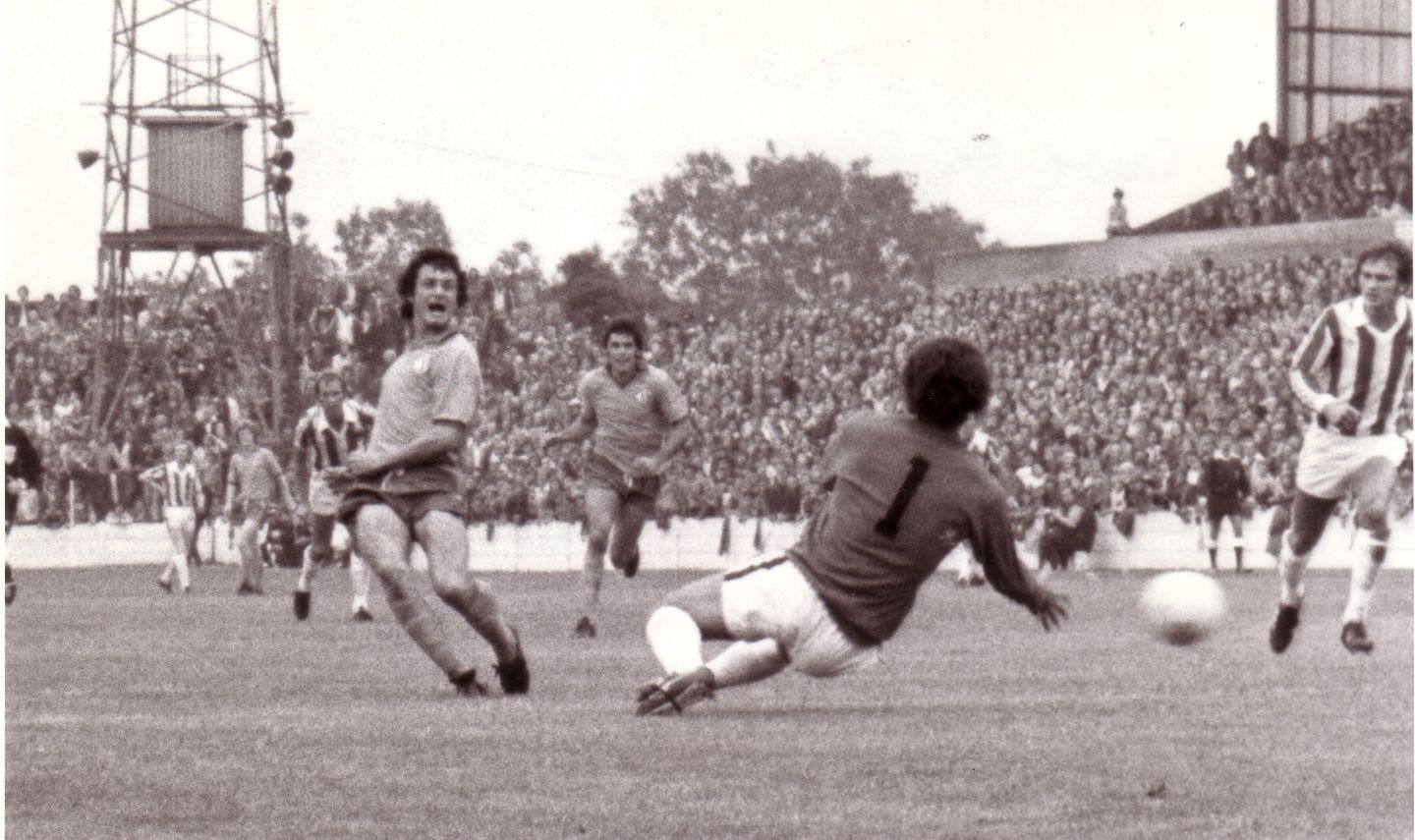
The 1967-68 season was again to be a dramatic one as Stags finished in the bottom four of Division Three but were spared relegation as Peterborough United had sufficient points deducted by the Football League to ensure that they finished bottom.
Peterborough's crime was to make illegal payments and bonuses to their players. Manager Tommy Cummings had left the club in July 1967 to take up the vacant manager's chair at Aston Villa and was replaced by Tommy Eggleston, who brought in Jock Basford as his assistant.
After winning the opening game of the season, 4-2 over Southport, with two goals by Peter Morris, a disastrous run followed with only one more win from the next 17 games, and by mid-December, Stags were rooted to the foot of the table. A run of five successive wins between 23 December and 03 February lifted Stags to fourth from bottom, and despite only winning four of their last 19 games, Stags somehow managed to avoid relegation.
Indeed, the last four games of the season were all lost but defeats for their nearest rivals, together with the punishment for Peterborough United, kept the Stags up on goal average. Even then, it was incredibly tight as Stags finished with a goal average of 0.761 compared to Grimsby Town's 0.754.
To show how close Stags were to relegation, they lost their final game 3-0 to Bournemouth - had Bournemouth scored a fourth, Stags would have been relegated. Meanwhile, in the FA Cup, Stags lost 5-1 to North Eastern League side Tow Law Town in one of the most humiliating defeats in Stags' history.
During the season, Peter Morris, who had been a regular in the side since 1961 and had been one of Stags' all-time great players, left the club for First Division Ipswich, for the measly sum of just £15,000. He was later to return to Field Mill in the mid-70s as player-manager.
The 1968-69 campaign was to be a season of mid-table mediocrity in Division Three thanks to 14 games won at Field Mill and only two won away from home (those being the first and last away games of the season). But it was a year of glory in the FA Cup. In the first round, Stags were again drawn against Tow Law Town.
Stags were behind after only 13 minutes but recovered to win 4-1, with two goals from Bob Ledger. Rotherham United were seen off at Field Mill in the second round, after a replay, and Second Division Sheffield United were beaten 2-1 in the third round thanks to two goals from Dudley Roberts.
Mansfield were drawn at home to Fourth Division Southend United in the fourth round and had to come from behind to win 2-1 with goals from Nick Sharkey and Dudley Roberts. It took the Stags into the fifth round for only the second time in their history. Stags were drawn at home to West Ham United, who were standing sixth in the First Division and who had three World Cup winners in their side: Bobby Moore, Martin Peters and Geoff Hurst along with youngsters Billy Bonds and Trevor Brooking. The game was postponed five times before it finally went ahead on Wednesday 26 February 1968, on what turned out to be one of the greatest nights in the club's history.
In front of 21,117 at Field Mill, the Stags took the lead after 22 minutes when Dudley Roberts turned the ball into the net after Ray Keeley, Jimmy Goodfellow and Nick Sharkey had ripped the West Ham defence to shreds. On 38 minutes, Keeley scored a tremendous goal to make it 2-0. West Ham keeper Bobby Ferguson punched the ball off the head of Roberts as he went up for a cross but it only went straight to Keeley who hit it first time on the volley into the net.
On 49 minutes, Sharkey set the seal on an historic evening - Ferguson had dived at his feet, but Sharkey won the ball back and slipped it into the far corner of the net. Stags' manager Tommy Eggleston said: "It was a very good display all round."
Meanwhile, West Ham boss Ron Greenwood said: "We didn't play badly, so they must have played very well to beat us."
Stags thus became only the fourth team in club history to knock out clubs from five different leagues in the same competition. Also, this was Stags' first ever win over First Division opposition.
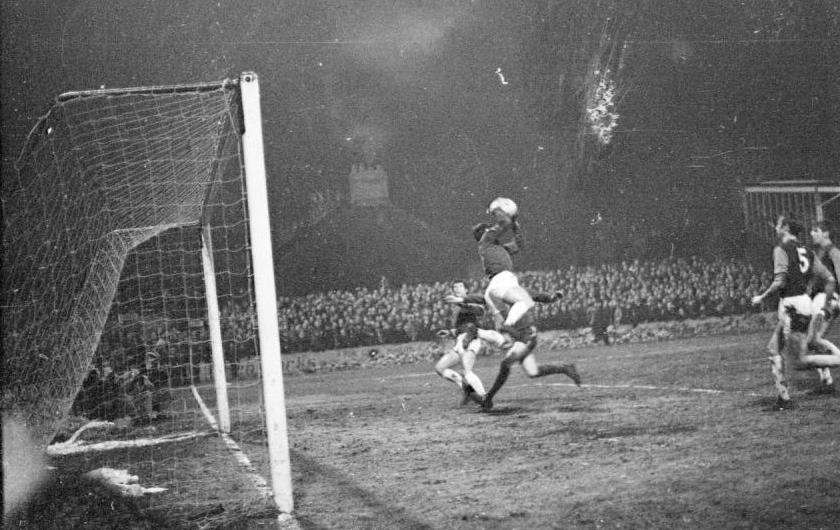 In the quarter-final, Stags were drawn at home again, this time to Leicester City. The game was delayed a week from 01 March to 08 March, which meant that Stags were included in the draw for the semi-final for the only time in their history. In front of 23,500, Stags lost 1-0 to a goal from Rodney Fern after 58 minutes, but were unlucky to lose and were thwarted by Leicester 'keeper Peter Shilton, who was later to play for England. At the end of the season, Stags were awarded the prestigious "Giantkillers Cup" by the Daily Mirror for their exploits in the FA Cup.
In the quarter-final, Stags were drawn at home again, this time to Leicester City. The game was delayed a week from 01 March to 08 March, which meant that Stags were included in the draw for the semi-final for the only time in their history. In front of 23,500, Stags lost 1-0 to a goal from Rodney Fern after 58 minutes, but were unlucky to lose and were thwarted by Leicester 'keeper Peter Shilton, who was later to play for England. At the end of the season, Stags were awarded the prestigious "Giantkillers Cup" by the Daily Mirror for their exploits in the FA Cup.
After a season of mid-table mediocrity in Division Three with glory in the FA Cup in 1968-69, the 1969-70 season proved to be more successful in the league with further excitement in the FA Cup.
Stags finished sixth in Division Three thanks to a fine end to the season, in which nine of the final 16 games were won. The goal-scoring honours were taken by Dudley Roberts and Malcolm Partridge who, between them, knocked in 34 goals during the season with Roberts netting 19 and Partridge 15.
Stags hit a purple patch during March and early April, winning six consecutive home games during the period, culminating in a 2-0 home win over Rotherham on 04 April 1970 which saw Dudley Roberts make his 100th Stags appearance and Stuart Boam making his 150th consecutive appearance.
Three days earlier, Stags thumped Southport 5-0 at Field Mill. The game provided a hat-trick for Dudley Roberts, the first hat-trick by a Mansfield player for five years, and a couple of goals for 19-year-old Duncan McKenzie, who was starting his first game for the Stags on loan from Nottingham Forest. McKenzie ended the season with ten appearances, including three as a substitute, and scoring three goals, before returning to Forest at the end of the season. He came back to Field Mill three seasons later, again on loan.
Stags had more glory in the FA Cup, after reaching the sixth round the previous season, this time the Stags reached the fifth round. After seeing off Bury and Shrewsbury in the first two rounds, Stags were at home to Barnsley in the third in front of 14,000 at Field Mill in a seesaw encounter. Stags ran out 3-2 winners with goals by Phil Waller, Malcolm Partridge and Jimmy Goodfellow.
Mansfield were drawn away to Arsenal or Blackpool in the fourth round. After a postponement and a drawn match, Blackpool eventually beat Arsenal 3-0 in the replay. Blackpool were riding high, eighth in the Second Division and were eventually to be promoted, but two goals from Stags' striker Dai Jones on four minutes and 89 minutes gave Mansfield a mighty victory in front of 5,000 travelling Stags' fans amongst a crowd of 23,715.
Dudley Roberts said after the game: "We never heard the Blackpool supporters, just one long roar cheering us on." The win set up a fifth round trip to Leeds United, who were the current First Division champions and again leading the table. Stags took an estimated 10,000 fans to Elland Road on the 07 February in an attendance of 48,093, which was Leeds' highest of the season. The Stags lost 2-0 to goals from Johnny Giles after 27 minutes and Alan Clarke after 34 minutes.
However, Mansfield were not disgraced and chairman Arthur Patrick spoke for everyone after the game when he said: "I have never been so proud of a Mansfield side, not even when they beat West Ham."
There was real controversy when Stags had a goal disallowed after just 13 minutes as Dudley Roberts nodded a ball down for Jimmy Goodfellow to crack home but the referee ruled that Roberts had climbed over Paul Reaney. It was an incident that could have changed the course of Stags' history. As it was, Leeds reached the cup final only to be beaten. In the League Cup, Stags knocked out Notts County in the first round 3-1 at Field Mill before going out to Queens Park Rangers after a replay.
The 1970-71 campaign again saw Stags riding high in the league, finishing seventh with Dudley Roberts again top scorer with 24 league and cup goals. In addition, Roberts scored the only goal in 1-0 wins over both Notts County and Nottingham Forest to claim the Nottinghamshire County Cup.
Before the start of the season, manager Tommy Eggleston was tempted away by a £10,000 a year contract from Greek side Ethnikos. Eggleston was replaced by Jock Basford who had been at Field Mill since 1967 as trainer-coach to Eggleston.
In the FA Cup, Stags were dumped out by Scunthorpe in the second round after a first round win over Wrexham. The League Cup saw a joyous 6-2 trouncing of Chesterfield in the first round with a Malcolm Partridge hat-trick.
Liverpool hit the woodwork five times at Field Mill, but the Stags were unlucky after 76 minutes when a Dudley Roberts header was disallowed for pushing and the game ended 0-0.
Before the replay, Malcolm Partridge was sold to Leicester for a club record of £50,000. In front of 31,087 at Anfield, Stags lost the replay 3-2 after extra-time and came so close to another upset. Mansfield were ahead or level for 108 of the 120 minutes. Jimmy Sutton put Stags ahead after 90 seconds with a shot off the underside of the bar from 30 yards. Emlyn Hughes equalised after 15 minutes before John Stenson restored Stags' lead with a magnificent header on 65 minutes.
Mansfield were dealt a cruel blow when Clive Walker was adjudged to have handled the ball in the penalty area on 81 minutes and Liverpool were awarded a penalty, which was converted by Tommy Smith. The winning goal for the Reds came after 102 minutes when Alun Evans converted a Steve Heighway cross. In the league, Stags had a good start and a good finish to finish a highly respectable seventh, but a run of just four wins in 19 games between early October 1970 and mid February 1971 prevented better things. At the end of the season, Stuart Boam was sold to Middlesbrough for £50,000.
The following season was one of disaster as the Stags were relegated to Division Four after nine seasons in Division Three. In an unbelievable first half of the season, Stags failed to score at Field Mill in a league game until 18 December 1971, at home to Plymouth.
It was their tenth home game of the season, and they still lost it, 3-2, to remain rooted to the bottom of the table. Plymouth had taken the lead in the 19th minute, but on 23 minutes the elusive home goal finally arrived, as John Fairbrother headed home from a Sandy Pate cross. But the cheers from the majority of the 3,728 crowd turned to groans of frustration by the final whistle as Stags went down to another defeat. The run without a goal at the start of a season of 833 minutes is a Football League record.
During this period, manager Jock Basford was sacked in November 1971 and replaced by Danny Williams. Mansfield finally won their first home league game of the season in the next home game on New Year's Day against Chesterfield. An improvement in form then followed but there were too many drawn games. Stags went into their final game of the season at home to Wrexham on 01 May 1972, knowing that a win would ensure safety.
Winger Dave Thompson put Stags ahead on 56 minutes with a diving header, but disaster struck on 83 minutes when a tentative, swirling shot from 30 yards by Wrexham's Mike Evans deceived 'keeper Graham Brown and squeezed into the net just by the post. So Mansfield finished their programme with a draw, but could still survive if other teams, Tranmere and Rochdale, who still had games to play, stumbled. Unfortunately, they didn't, and Stags were relegated on goal difference.
In the FA Cup, Stags were beaten by Tranmere in the second round, whilst in the League Cup, they were humbled 5-0 at Field Mill by Chesterfield. Stags retained the County Cup with a 3-1 win over Notts County on 15 May 1972, but it was cold comfort as they relegated on the same night with Tranmere's result elsewhere in the league.
The 1972-73 campaign saw the Stags back in Division Four and off to a magnificent start. They won the opening five games, and indeed won eight out of the first nine with one draw.
Mansfield remained top of the table right through to 30 December when a 0-0 draw at home to Doncaster extended an unbeaten home run to 27 games - an extraordinary turnaround from the first half of the previous season. But Stags won just six of their last 20 games after the turn of the year to gradually drop down the table.
The season saw defender Kevin Bird and winger Jimmy McCaffrey become firm favourites, and another spell on loan for Duncan McKenzie three seasons after his first spell. This time, he was on loan with a view to a permanent transfer, but he was so successful, scoring seven goals in just six appearances, that Nottingham Forest recalled him.
McKenzie went on to a successful career with Leeds, Everton and Chelsea. Stags went into the final game of the season away to Cambridge knowing that a win would earn them promotion and they led twice through McCaffrey and Dudley Roberts only to lose the game 3-2 with Cambridge thus being promoted in their place.
The following season, 1973-74, was one of disappointment as Stags finished in 17th place and failed to make any significant progress in the cup competitions. The season started promisingly enough as the Stags won their opening seven home league games with new signing Terry Eccles in prolific goal-scoring form including two hat-tricks.
The first home defeat of the season did not arrive until 10 February, by which time they had won ten and drawn three at Field Mill. But the home form then tailed off and failure to win a single away game during the whole season ensured a disappointing campaign. Terry Eccles ended the season as top scorer with 22 goals followed by Dudley Roberts with seven.
Roberts' final game for the Stags was a 2-1 win at home to Newport County in February 1974 - in which he scored - before he was sold to Scunthorpe for a £4,000 fee. He had been at Field Mill for six years, in which time he scored 66 goals. Manager Dan Williams left the club in March to take control at Swindon for a second time and was replaced by Dave Smith in April. During the intervening month, Jock Basford was again in charge, as caretaker manager.
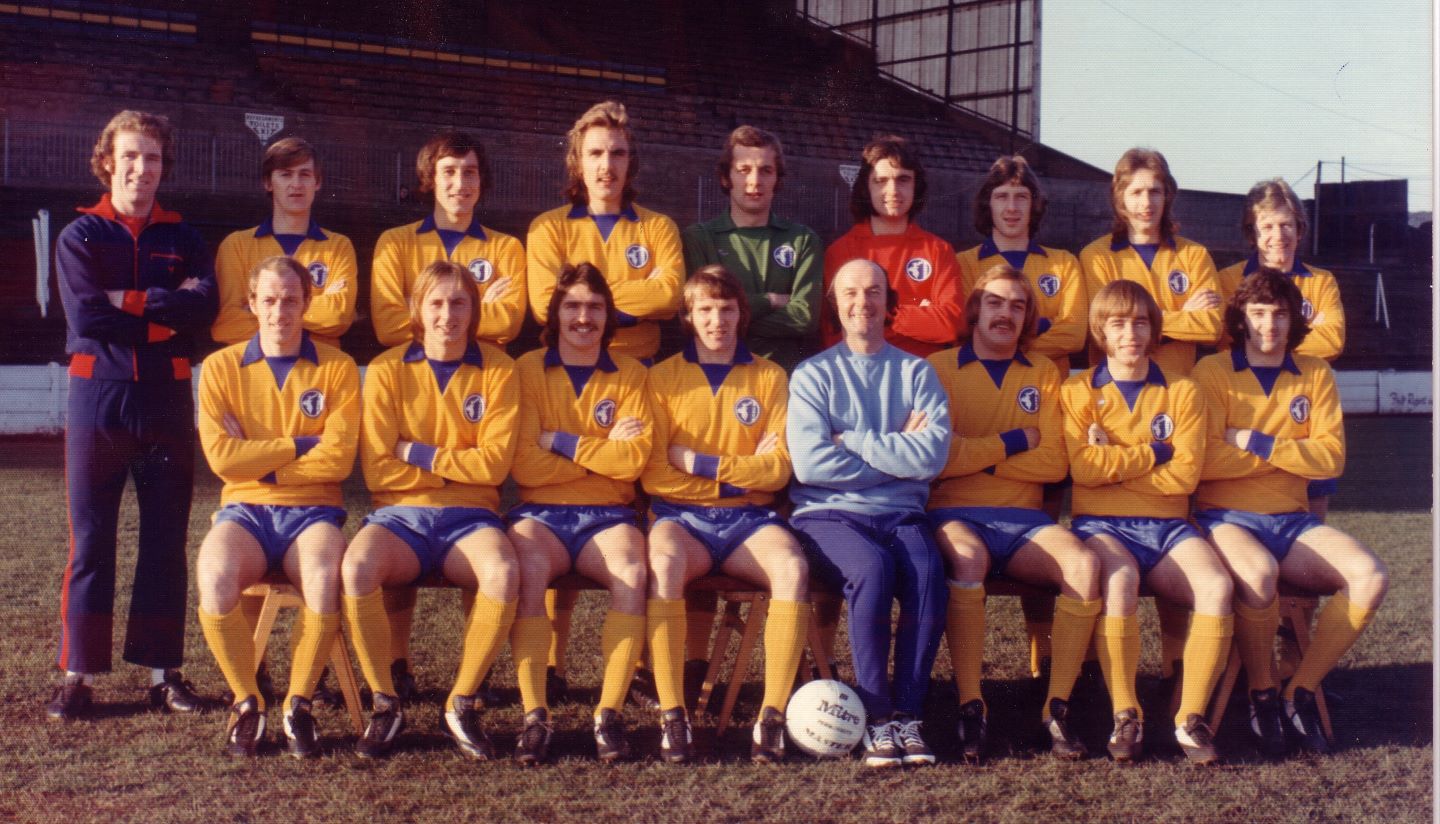 The next campaign, 1974-75, was one of the finest in Stags' history and is remembered by many Stags' fans as one of the most enjoyable ever. Stags were champions of Division Four and clocked up over 100 goals in all competitions.
The next campaign, 1974-75, was one of the finest in Stags' history and is remembered by many Stags' fans as one of the most enjoyable ever. Stags were champions of Division Four and clocked up over 100 goals in all competitions.
Before the start of the season, Dave Smith made two significant signings, bringing in striker Ray Clarke and midfielder Gordon Hodgson. Clarke was to be an instant hit and ended the season with 30 goals as Stags led the table throughout almost the whole season. There were so many memorable games with perhaps the pick being a 7-0 demolition of Scunthorpe United at Field Mill on 21 April 1975 to clinch the title. The goals were scored by Ray Clarke (2), John Lathan (2), Kevin Bird, Gordon Hodgson and Terry Eccles. Promotion was achieved four games earlier with a 2-0 win over Hartlepool at Field Mill with goals from Clarke and Hodgson.
Clarke, Sandy Pate and Hodgson were included in the PFA Division Four All Stars XI, selected by fellow players. There was also some success in the FA Cup as Stags reached the fifth round and a home tie with First Division Carlisle United at Field Mill. The game was featured on BBC's Match of the Day, but the Stags were beaten 1-0 despite having the better of the play in front of 18,293, the biggest attendance since 1969 when Leicester visited Field Mill in the sixth round of the FA Cup. Indeed, Field Mill has not hosted a crowd anywhere near this size since with only the 16,019 at home to Sheffield Wednesday in March 1980 coming close. Terry Eccles ended up as second top scorer with 20 goals.
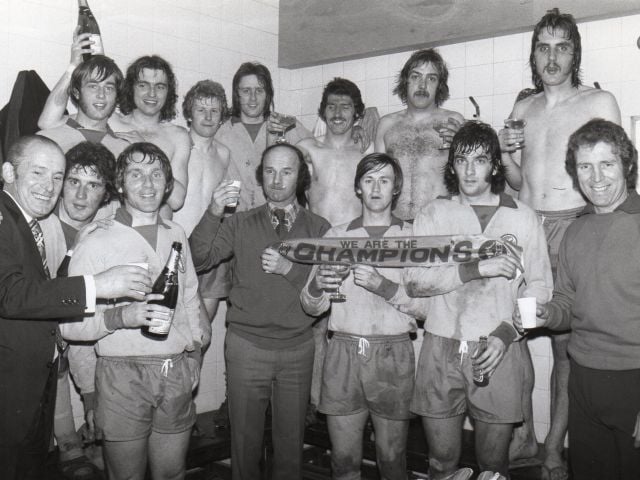
The 1975-76 season was also an extraordinary one. Stags were back in Division Three, but made a disastrous start and by mid February were five points adrift at the bottom having won just four of their opening 27 games. Incredibly, Stags remained unbeaten for the final 19 games of the season winning 12 and drawing seven, to end the season in the top half of the table and only nine points from a promotion place.
There were several highlights, including a 3-0 win over Sheffield Wednesday at Field Mill in front of 13,409, with goals from Sandy Pate, Ray Clarke and Gordon Hodgson, and a 3-0 win at Peterborough United in front of the BBC Match of the Day cameras, with two more Ray Clarke goals and a Jimmy McCaffrey effort.
There was more success in the League Cup as two First Division sides were beaten in memorable nights at Field Mill. First to go were Coventry City, with goals by Clarke and Eccles in a 2-0 win, followed by Wolves who were beaten by a solitary Ian McDonald goal. In the quarter-final, Stags were away to First Division Manchester City but were beaten 4-2 in an epic encounter.
Ray Clarke scored in the 17th minute, to level the scores at 1-1 before the Stags finally succumbed in front of more than 30,000 at Maine Road. City went on to win the cup.
The season was another triumph for Ray Clarke as he notched another 29 goals (including Anglo-Scottish Cup). However, just three days after the end of the season, Clarke shocked the Mansfield public by asking to be placed on the transfer list, claiming he was not happy about spending another season in Division Three. Clarke made it clear that he had enjoyed his stay at Mansfield, but would not be satisfied until he could play in a higher grade of football.
In July 1976, Clarke was transferred to Sparta Rotterdam for a new Stags' record fee of £90,000. In two seasons at Field Mill, Clarke scored 59 league and cup goals, missing just one game in the process. Just a few weeks earlier, Stags' fans had also been shocked by the sudden departure of manager Dave Smith. Chairman Arthur Patrick announced that Smith had been relieved of his duties, which seemed strange during such a long unbeaten run, and the reason for the dismissal remains a mystery. It seemed he was dismissed for no apparent reason.
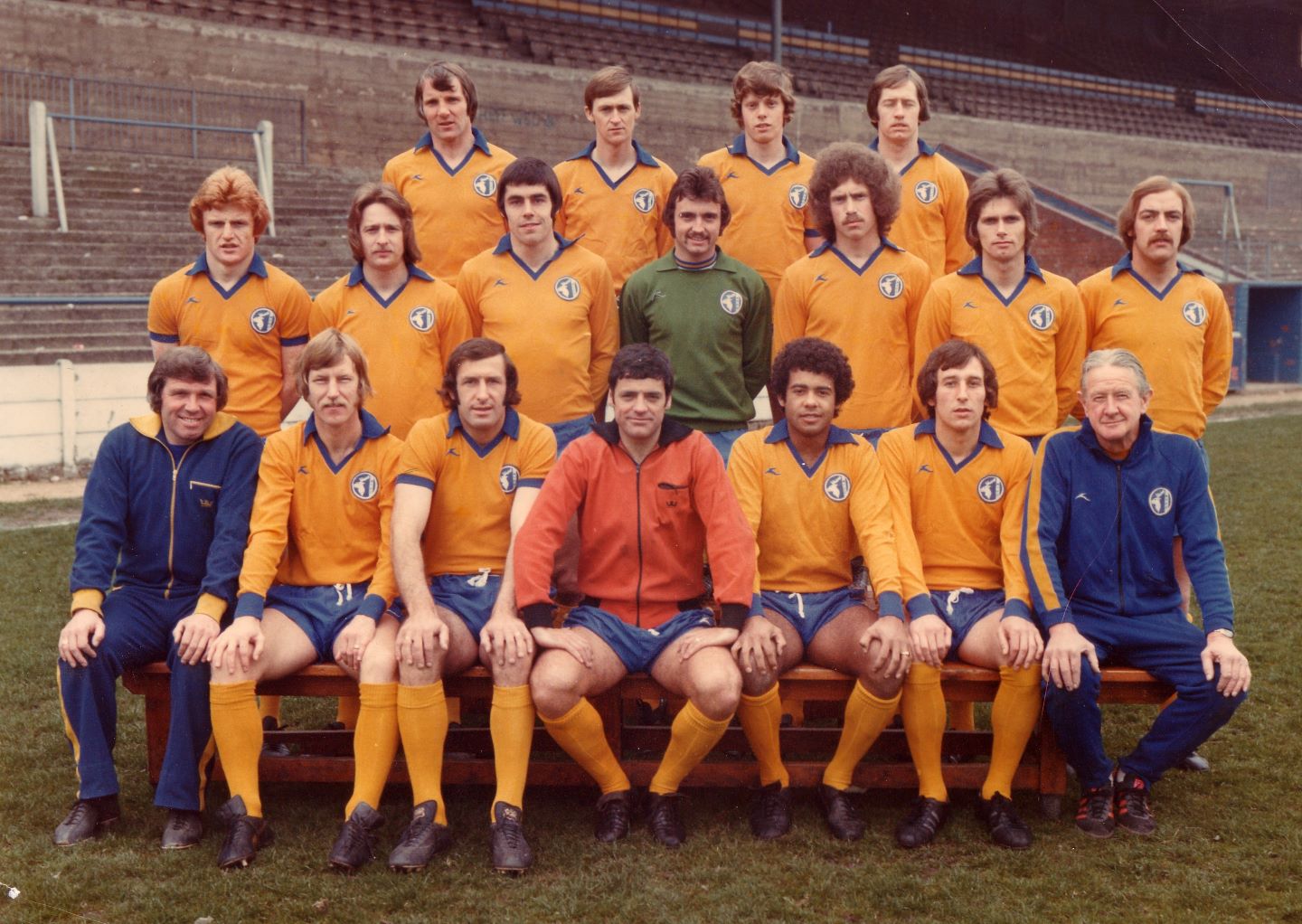 In 1976-77, Mansfield were promoted from Division Three to Division Two for the first and only time in their history. It was a fantastic achievement, especially to win the championship, and to some extent this vindicated the controversial sacking of Dave Smith towards the end of the previous season.
In 1976-77, Mansfield were promoted from Division Three to Division Two for the first and only time in their history. It was a fantastic achievement, especially to win the championship, and to some extent this vindicated the controversial sacking of Dave Smith towards the end of the previous season.
Former Stags' favourite Peter Morris was brought in as player-manager before the season started, but he made few changes to the starting line-up as the side continued their stunning form, winning five of the first six games. However, this included a 3-0 defeat at Rotherham to end a 20-match unbeaten run. The only player to be brought in was Johnny Miller, a winger from Norwich, whilst Kevin Randall, the former Chesterfield and Notts County striker, who had scored just three goals in 19 appearances the previous season, was the man chosen to lead the attack in place of Ray Clarke.
Randall was to prove a great success and finished the season with 19 goals (plus another in an abandoned game). The highlight was when, on 08 November 1976, Randall scored all four of the Stags' goals in a 4-0 thrashing of Reading. The Stags hovered around the top six until mid-December, when they were also beaten in the second round of the FA Cup by Northern Premier League side Matlock Town by 5-2 at Field Mill. It was a shocking scoreline - one of the worst in Mansfield's history - but the following day, Morris signed striker Ernie Moss, Randall's former striker-partner from Chesterfield, and this proved to be the final part of the Stags' jigsaw.
Stags went on to win 12 of their next 14 games, including six consecutive games in which Moss scored. By the end of this run, in mid-March, Stags had catapulted themselves to the top of the table, just ahead of Brighton and Hove Albion, Crystal Palace, Rotherham and Wrexham - all of whom were to feature in the race for promotion.
In a tight and tense run-in, the Stags were never outside the top three and they clinched promotion on Monday 02 May 1977 with a 2-0 home win over Portsmouth. It was fitting that Moss and Randall scored the goals. Two games still remained. The first - a 3-0 win over Northampton at Field Mill - took the unbeaten home league record to an incredible 37 games.
Mansfield went to Wrexham in the final match of the season on 14 May 1977, needing a draw to clinch the Division Three championship. Meanwhile, Wrexham needed to win to gain promotion. Writing in the CHAD, Stan Searl described the action: An afternoon for the 3,500 Mansfield Town fans, and every member of the team and officials at the Wrexham game, to remember for a lifetime - yet one member of the side will have to rely on newspaper cuttings and gossip for his memories of the historic occasion.
Player of the Year Rod Arnold was knocked cold right on the half-time whistle, and he could recall little of the preceding 90 minutes as he changed at the end of the game - except Mansfield had won and were champions, and Ernie Moss scored the winner.
To remind him of his contribution, it was a super save which kept out a Billy Ashcroft header in the 33rd minute. It was left to the old firm of Ernie Moss and Kevin Randall to finally kill-off Wrexham's hopes of promotion. Randall eeled his way past his covering defender right on the bye-line, and chipped the ball in for Ernie Moss to score and send the Mansfield contingent of fans behind the goal, wild with delight.
There were scenes of great emotion after the final whistle as the Mansfield players and fans celebrated their second championship in three seasons.
It was one of the greatest days in the Stags' history. Moss ended the season with 13 goals for the Stags in 29 games and hence as second top scorer to Randall. And so, Gordon Hodgson, who had been made team captain in mid-season taking over from Sandy Pate, was soon able to hold the championship trophy aloft.
The 1977-78 campaign turned out to be the first and only season in the old Division Two. Relegation seemed almost inevitable throughout the season as only six league games were won before Easter.
However, Mansfield did get off to a great start, beating Stoke City 2-1 at Field Mill on the opening day, with new signing Dave Syrett, a striker from Swindon, scoring one and Pat Sharkey the other from the penalty spot, against goalkeeper Peter Shilton. The strike partnership of Moss and Syrett kept Randall out of the side and Randall was soon sold to York, but disaster struck when Moss, who had not been fully fit for weeks, was ruled out for the season in November, having already scored six times.
There were some memories for Stags' fan to cherish, especially a 3-3 draw at home to Tottenham on 25 March 1978, featuring a Syrett hat-trick, and a last minute equaliser from a free-kick by Glenn Hoddle. This was followed two days later by a 2-0 win at Fulham, which started a run of four wins from the final eight games, but it was nowhere near enough to avoid relegation.
Syrett was Player of the Season for his 16 league goals. The fact that the second top scorer was Moss with his six goals told the story of Stags' failing. Manager Peter Morris left the club in February 1978, with 27 games of the season gone, to take the job of assistant manager at Newcastle United. His replacement was Billy Bingham, who also managed Northern Ireland and Everton.
The season also marked the final appearances of a long career at Field Mill for right full-back Sandy Pate, who played over 400 games for the Stags and was captain during most of that time. Mansfield won their first game in the County Cup since 1972, beating Notts County in the semi-final, but the final was held over to the following season, when the Stags lost 4-0 to Nottingham Forest.
In 1978-79, the Stags were back in Division Three and they got off to a bad start, winning just six of their opening 35 games, to leave them firmly in the relegation zone by April 1979. However, another six victories in the final 11 games of the season led the Stags to safety in 18th place.
Top scorer for the season was full-back Bob Curtis with just six goals, five of which were from the penalty spot, though new signing, striker Terry Austin, notched five in the final 16 games to help see the Stags to safety. Austin had signed from Walsall with Dave Syrett going in the other direction in a deal that valued Syrett at £105,000.
Player of the Season was Mick Saxby, but at the end of the campaign, the young centre-half was transferred to Luton Town for a new club record fee of £225,000. There was little joy in the cup competitions either, going out in the first round of the League Cup for the third consecutive season, and also in the first round of the FA Cup.
The 1970s saw the only two championships in the Stags' history in the Football League, and their only season in the old Second Division.
The 1979-80 season saw the Stags relegated from Division Three. Before the season started, manager Billy Bingham’s contract was terminated by mutual consent just a year into his three-year contract. He was replaced by Mick Jones, a 32-year-old who had been manager of non-league Kettering for the previous two years. The Stags won only 10 games all season, nine at home and just one away, and were never out of the relegation zone from the beginning of January onwards.
Terry Austin was top scorer, continuing his good form from the end of the previous season, scoring 19 league goals and a further three cup goals. But alongside Austin, Steve Taylor, signed at the start of the season for £65,000, a club record at the time, scored only seven league goals. Highlights of a disappointing season were a 3-2 win at home to Chesterfield on the opening day of the season, and a 5-1 win at home to Rotherham, with an Austin hat-trick and two goals for Taylor.
Centre-half John McClelland was Player of the Season. In the FA Cup, the Stags did reach the third round before being beaten by Brighton, and also reached the third round of the League Cup, before losing to QPR.
In 1980-81, the Stags were back in Division Four for the first time since 1974-75. By the beginning of October 1980, Mansfield were in mid-table. But then six wins on the trot catapulted the Stags into the top four, and then another seven wins in ten games from the end of December through to the beginning of February kept the Stags firmly in third place.
Highlights included a 4-1 win at home to Crewe and a 5-0 win at home to Port Vale on successive Saturdays in January 1981. The 5-0 win against Port Vale saw all five goals scored in an incredible opening 45 minutes.
But Mansfield ended the season with a disastrous run of just two wins in the final 14 games to finish in seventh place, six points adrift of the promotion places (in the day of two points for a win). Halfway through the season, Terry Austin had been sold to Huddersfield for £120,000. He was replaced by striker Jim Lumby who was signed from Tranmere, and who was already top of the Division Four goalscoring list with 18 goals for Tranmere in the first half of the season. One positive of the season was the emergence of young Scottish striker Dave Caldwell, who scored eight league goals in 23 starts.
Two games before the end of the 1980-81 season, chairman Arthur Patrick resigned, after nearly 14 years in the role. He had presided over the most successful period in the club’s history, including winning both Division Three and Division Four, and reaching the second tier of English football for the only time, along with numerous good cup runs, including beating West Ham United in 1969.
Arthur Patrick resigned for what he described as “purely personal” reasons, and he was succeeded by John Almond, who had been a director for 14 years. Almond’s first task was to sack manager Mick Jones after two years in charge, with one game of the season remaining, with Jones having failed to win promotion back to Division Three following relegation in his first season.
The 1981-82 season was a poor one, as Mansfield finished 20th in Division Four. Stuart Boam was appointed player-manager before the season began. Boam had been a fine centre-half for the Stags in the 1960s. Before Boam was appointed, John McClelland was sold to Glasgow Rangers for £90,000.
It was a season of very few highlights, and attendances plummeted, with just 1,394 turning up against Torquay United in the penultimate home game of the season, the lowest post war crowd at Field Mill for a league game at the time. Jim Lumby was top scorer with 14 league goals plus another three in cup games. Midfielder Noel Parkinson was Player of the Season. Yet, at the end of the season, both Lumby and Parkinson were released by manager Boam.
Before the start of the next season, Mansfield Town was taken over by 35-year-old Nottingham businessman Richard Hartley, owner of the Motorist Discount Centre. Hartley, who had previously been commercial director at Notts County, became the club’s youngest ever chairman at the time, as John Almond became vice-chairman. Almond explained that the club had been thrown a financial lifeline by Hartley and that at one stage the previous season the club had been losing £4,000 per week.
Results in the 1982-83 season improved, but the Stags were only in mid-table by January 1983, and three defeats on the trot saw manager Boam sacked. It had been an unsuccessful 18 months in Boam’s first foray into management. Attendances had continued to be poor, with just 1,293 turning up against Torquay United, the lowest post war crowd at Field Mill for a league game, beating the record set the previous season.
Chairman Hartley appointed Ian Greaves as Boam’s successor. Greaves was hugely experienced and had been successful at clubs in higher divisions such as Bolton Wanderers and Huddersfield Town and it was considered quite a coup for the club to secure his services. Greaves’ first appointment was that of John Jarman as his assistant manager. Jarman came to Field Mill from Wolves where he had been youth development officer and part of his duties at Mansfield would be to discover and develop youngsters for the club.
The Stags remained in mid-table for the rest of the season and finished in tenth place. Goalkeeper Rod Arnold was the Player of the Season and became the club’s record appearance maker during the season. Arnold was to leave the club the following season, having made 513 league and cup appearances. Another great servant, defender Kevin Bird, was released at the end of the 1982-83 season. Bird is third in the club’s list of appearance makers, having made 452 league and cup appearances. Bird also scored 63 league and cup goals, putting him in the top 15 goalscorers in the club’s history, not bad for a defender!
The 1983-84 campaign was another season of struggle for the Stags, finishing 19th in Division Four. However, Ian Greaves was starting to assemble a squad that would bring success in forthcoming years as he brought in 26-year-old centre-half George Foster as captain, and young goalkeeper Kevin Hitchcock (initially on loan then signed permanently), to add to left back Mark Kearney and midfielder Tony Lowery who had joined the previous season. Greaves said he was going to build a successful side around Foster, and he did that over the next five years. However, Greaves was not only been busy with first team matters, he had been trying to put in place a strong youth set up, along with Jarman. Greaves also brought in Billy Dearden, as coach, to complete his managerial team.
There were some highlights in the season as Dave Caldwell scored a hat-trick in a 5-2 win at home to Aldershot, and then scored four times in a 26-minute spell just three weeks later in a 5-0 win at home to Hartlepool. Caldwell’s fourth goal was particularly memorable as his thunderous shot from a tight angle on the right at the North Stand end flew into the net. It capped a day when it just seemed that an inspired Caldwell could do no wrong.
Caldwell was an entertaining player who had a habit of scoring spectacular goals and is still considered an all-time hero by many Stags’ supporters, but also had a poor disciplinary record, sent off twice and receiving an astonishing eight suspensions.
It was a season of contrasting results, for example the Stags beat Halifax 7-1 with a hat-trick by on-loan striker Ian Juryeff, yet lost 7-1 away to Aldershot. Caldwell ended the season as top scorer, with 21 league goals in 37 starts, plus another two cup goals.
The following season, 1984-85 saw a small improvement in league form as Mansfield finished 14th in Division Four. Despite finishing in the bottom half of the table, remarkably the side equalled a club record for the number of clean sheets in a season, 20, and set a post-war club record for the fewest goals conceded, just 38.
But there were far too many drawn games, 18 in total, which itself was only two off a club record. Goalkeeper Kevin Hitchcock was the Player of the Season, with captain George Foster and young central defensive partner Colin Calderwood rocks in the defence. The defensive record showed much promise for the future under Ian Greaves. In the FA Cup, Dave Caldwell scored the fastest goal in the club’s history, after just 11 seconds in a 2-1 win at home to Rotherham.
But it was for the games in the Freight Rover Trophy (also known as the Associate Members Cup, a competition just for Division Three and Four clubs) that the season will be remembered. The Stags beat Hull, Bradford, Burnley and Bolton to set up a Northern Area Final at home to Wigan Athletic in May 1985. It was a one-off game with a huge prize for the winners: a place in the Final at Wembley Stadium.
The Stags had never been to Wembley and that was a big deal for the supporters. Over 9,000 fans crammed into Field Mill (now named One Call Stadium) in a night of high drama. Wigan took the lead when an innocuous shot took an outrageous deflection off Stags’ captain George Foster’s boot and flew into the net. But just when all looked lost, in the 90th minute, Foster scored an unbelievable goal at the other end, firing into the top corner of the net from 25 yards. Foster went on to play 448 league and cup games for the club, putting him fourth in the club’s list of appearance makers (behind Rod Arnold, Sandy Pate and Kevin Bird) and he only scored one other goal! The game went to extra-time, but Mansfield couldn’t force a winner. The game then went onto penalties and Wigan won 3-1. It was an evening of incredible excitement that ended with agonising disappointment. The club would have to wait two more years for that first visit to Wembley!
Earlier in the season, in November 1984, there was shock news that chairman Richard Hartley had resigned and severed all links with the club after less than two-and-a-half years in charge. Hartley cited that he had to leave because of his business commitments elsewhere. However, this was not the full story, and Hartley had in fact gone bust. John Pratt (known as Jack Pratt), chairman of Sutton-based Abacus Group of companies including Abacus Lighting, took over as chairman. Pratt, a highly respected businessman who later received an OBE, had already been on the Mansfield Town board for 17 years.
The 1985-86 season was a great one, as the Stags were finally promoted back from Division Four to Division Three. Before the season started, there was a shock as defender Colin Calderwood joined Swindon in a controversial move that upset the Stags, who were expecting him to stay.
The Stags received just £30,000 from Swindon at a tribunal, though some years later received half of the £1.25 million that Swindon received from Tottenham Hotspur when he was sold on. As a result, it is technically a club record fee received of £655,000. Swindon were later found guilty of making illegal payments, and were demoted two divisions. Calderwood would go on to play for Scotland.
Ian Greaves brought in striker Keith Cassells, a player who was to become one of the most popular players in the club’s history, winger Neville Chamberlain, and another winger Kevin Kent, while Dave Caldwell left to join Chesterfield. The season got off to a great start with a 4-0 win at home to Hereford, with Cassells scoring a hat-trick and becoming the only player since the 1930s to score a hat-trick on his debut. Chamberlain scored the other goal. On three occasions during the season, the Stags won four games on the trot.
By Easter 1986, the Stags had won 21 of their 37 league games and promotion seemed a certainty. Four games without a win set the nerves jangling, but a 4-0 win at home to Hartlepool on a Tuesday night in April 1986 secured promotion with four games to spare. It was a joyous night with Cassells scoring twice and Chamberlain netting another, together with an own goal. The Stags ended the season in third place. George Foster was the Player of the Season and said that promotion was the proudest moment of his career, which made three years of hard work since he had joined the club all worthwhile. Neville Chamberlain was top scorer in the league with 16 goals, Cassells scored 13 league goals, striker Neil Whatmore scored nine, and Kevin Kent pitched in with eight. Meanwhile, the champions were Swindon and their manager Lou Macari said that Colin Calderwood was the difference between first place and third.
In the League Cup, the Stags were drawn in the second round against top flight side Chelsea, who were third in Division 1 at the time. It was a two-legged affair and the Stags roared into a two-goal lead in the first leg at Field Mill with goals from centre-half Gary Pollard and striker Cassells. But Chelsea scored two goals in the final 15 minutes, through David Speedie and Pat Nevin, to earn a 2-2 draw in an incredible game, and a rare opportunity to beat a top flight side had gone. Chelsea won the second leg 2-0 with two goals from Kerry Dixon, and Dixon was denied a hat-trick by a penalty save from Kevin Hitchcock.
The following season was another memorable one in the history of Mansfield Town. The Stags consolidated in the league, finishing tenth in Division 3. But the season was memorable for the club’s first ever trip to Wembley Stadium in the Freight Rover Trophy (the competition just for Division Three and Four clubs).
In the preliminary group stages, the Stags drew with Halifax and Rotherham and that was enough to progress to round one where the Stags won 1-0 at York with a goal from Neil Whatmore. The Stags then won 2-1 at Bury in the second round with goals from Kevin Kent and Tony Lowery. Mansfield were unlucky to again be drawn away, this time to Middlesbrough, a really tough draw, in the Northern Area semi-final. But the Stags performed superbly to come away with a 1-0 win thanks to a penalty from Mark Kearney after Keith Cassells had been brought down in the area.
Mansfield were therefore back in the Northern Area Final, as they had been two years earlier, but this time it was a two-legged tie and Chester were the opponents. A bumper crowd of 7,769 packed into Field Mill for the first leg, and two great finishes, from teenage striker Ian Stringfellow in the first half and from Keith Cassells in the second half, saw the Stags take a 2-0 lead into the second leg. Chester took an early lead after just 11 minutes in the second leg, but roared on by over 3,000 travelling fans at Sealand Road, the Stags held on for a 2-1 aggregate win on a great night for the club.
Mansfield had made it to Wembley for the first time ever. The date was Sunday 24 May 1987, and many fans still consider it to be the best day in the club’s history. An incredible 25,000 Stags’ fans made their way down for the game, against Bristol City, in a crowd of 58,586, which is incidentally the biggest crowd ever to watch a Stags’ game. In the first-half, Stags ‘keeper Kevin Hitchcock was forced to make several good saves.
But after 57 minutes, Kevin Kent put Mansfield ahead. Keith Cassells wriggled down the left and crossed low, for Kent to dart in front of his marker and sweep the ball past the keeper. The massed ranks of Stags fans erupted. It was so nearly 2-0 just minutes later when substitute Ian Stringfellow headed against the bar from a Cassells cross.
But on 87 minutes Bristol City equalised. City substitute Keith Curle, later to become a Stags’ manager, had a snapshot was blocked, but it fell for Glynn Riley who scored to make it 1-1. The Stags created chances to win it in extra-time but couldn’t find the net and so it went to a penalty shoot-out. The first player to miss was Mansfield’s Keith Cassells. He’d been brilliant for the Stags and that could have been a disaster. Bristol City scored their first four penalties to lead 4-2. But the Stags scored their next two, while Bristol City's next two penalties, by Gordon Owen and David Moyes, were memorably saved by the size 10½ boots of keeper Kevin Hitchcock.
This left centre-half Tony Kenworthy to step forward and slam home his penalty for a 5-4 penalty shoot-out win. Stags’ captain George Foster was soon climbing the famous 39 steps to collect the trophy. More than 10,000 Stags’ fans turned out on the streets of Mansfield the following day to cheer their heroes on an open-top bus. The win was a triumph for manager Ian Greaves, sealing his place as one of the club’s best ever managers, and he was many years later to have the main stand at One Call Stadium named after him.
The league season itself had been unmemorable, but tenth place back in Division Three was highly creditable. Keith Cassells played every league and cup game during a long season and was top scorer with 18 league and cup goals. He was also overwhelmingly chosen as Player of the Season.
The 1987-88 season started with a re-match against Bristol City at Field Mill on the opening day of the season. The Stags won it 2-0 with goals from Cassells and Stringfellow. Mansfield hovered for the first three-quarters of the season in mid-table, but there was plenty of excitement in the FA Cup as the Stags beat Preston, Lincoln and Bath City successively 4-2, 4-3 and 4-0 at Field Mill to reach Round 4. In Round 4, the Stags were at home to top flight side Wimbledon. Wimbledon won an exciting game 2-1, and went on to win the Cup, beating Liverpool 1-0 at Wembley with a goal by Lawrie Sanchez.
A bumper crowd of 10,462 fans packed into Field Mill for the game against Wimbledon and this remains the highest crowd at the ground since 1979. Wimbledon went into a two-goal lead as Alan Cork steered Dennis Wise’s right wing cross into the net, and then a dreadful error by Stags right-back Mike Graham, mis-kicking a clearance, gifted a goal to Terry Phelan who slid a first-time shot past Kevin Hitchcock. But, after 67 minutes, the Stags were back in it when Wimbledon goalkeeper Dave Beasant raced out of his area to clear a back pass, completely missed the ball, and Kevin Kent took full advantage dribbling the ball 20 yards into the net.
Just four minutes later came the crucial moment of the game. Lawrie Sanchez hauled down Tony Lowery as he surged into the box and Field Mill erupted as a penalty was awarded. The cheers turned to dejection as Steve Charles stepped up and firmly struck his spot kick but Beasant dived to his left to make a magnificent save.
The Stags were unable to get back into the game after that and boss Ian Greaves said afterwards: “The players were kicking themselves for not winning or at least earning a replay but if you give bad goals away and miss a penalty, then you don’t deserve to gain anything.” Meanwhile, Wimbledon ‘keeper Beasant wrote in his autobiography some years later: “Mansfield probably provided us with our biggest scare en route to Wembley and we needed a bit of luck to see them off at the first attempt.”
Back in the league, Mansfield went on a terrible run from mid-March 1988, losing nine out of 11 games, to plummet from mid-table to just outside the relegation zone. This dreadful run came immediately after goalkeeper Kevin Hitchcock, who had become a real hero to Stags fans, was sold to Chelsea for £250,000, a club record at the time.
With just two games of the season left, Mansfield were absolutely desperate for a victory against Brentford at Field Mill to stave off the threat of relegation. The game started badly as Brentford took the lead after 16 minutes as a tame shot squirmed from veteran goalkeeper Eric Steele’s grasp, allowing Robbie Carroll to stab into the net.
With 85 minutes gone, the Stags still trailed, and relegation was looming. Then it all changed. Left-back John Ryan put in a great cross from the left and Kevin Kent placed a perfect header past the Brentford keeper into the net. And after 90+3 minutes, Steve Charles was pushed off the ball in the area and the referee pointed to the penalty spot.
There was unbearable tension as Charles stepped up and converted the spot kick to win the game 2-1. It was an incredible moment after the frustration of the run of previous matches. The Stags were virtually safe and a draw at Port Vale the following Saturday secured their place in Division Three, although results elsewhere meant they would have been safe anyway. Kevin Kent was Player of the Season, while midfielder Steve Charles was top scorer with 16 league and cup goals, including six penalties, though he did miss that critical penalty against Wimbledon. Young defender Simon Coleman established himself in the side at centre-half alongside Foster and had an excellent season.
The 1988-89 campaign was another season in the third tier with the Stags in mid-table for the entire season, finally finishing in 15th place. There was a shock during the season when manager Ian Greaves left the club in February 1989. His departure came after a 2-1 defeat at Notts County and a run of just one win in eight games, including a 6-2 defeat at Wolves, in which the Stags scored first and last but conceded six times in between, including a Steve Bull hat-trick. Greaves was replaced by his captain George Foster, who became player-manager.
It was reported that Greaves had been sacked, and Greaves told the local CHAD newspaper: “I have been sacked but I wish good luck to George Foster. I leave Field Mill full of pride with my head held high.” However, years later, in an interview with the well-respected Mansfield Town fanzine “Follow The Yellow Brick Road”, Greaves cleared up that he did in fact resign, explaining that he thought he’d taken the club as far as he could. From Board meeting minutes that we have seen a copy of, we now know that Greaves had actually offered his resignation at a Board meeting a month earlier, and that was accepted, but he was asked to stay on until a replacement could be found. And that replacement was George Foster.
Greaves’ league record as manager of Mansfield Town was played 274, won 91, drawn 90, lost 93. More importantly though he had taken over the club as a mid-table Division Four side, and left it as a Division Three outfit, and given the club its memorable day at Wembley along the way, as well as leaving a stronger youth set up. He is the club’s longest serving manager, having been in charge for just over six years.
Popular striker Keith Cassells left the club at the end of the season after a terrific four years. He left to join the Hertfordshire police. His last home game was a 3-1 win over local rivals Chesterfield as Cassells scored but then ended the game in goal after an injury to goalkeeper Andy Beasley. Cassells was the top scorer for the season with 14 league goals, while young right-back Craig McKernon was Player of the Season. Highlights of the season included the double over Chesterfield, and a 3-1 win at home to eventual champions Wolves with two goals from Cassells and one from Kent, in revenge for that 6-2 defeat away.
The 1989-90 season saw Mansfield again finish 15th in Division Three. Towards the end of the previous season, manager Foster had brought in veteran striker Trevor Christie, and in October 1989 Foster also signed striker Steve Wilkinson, from Leicester, for a then club record fee of £80,000. The money for the Wilkinson signing came from the sale of young central defender Simon Coleman to Middlesbrough for £400,000, which again was a club record at the time. Young right-back Craig McKernon, who had been the Player of the Season the previous year, was also sold, to Arsenal for £200,000 in December 1989. Sadly, McKernon’s career was to be cut short by injury within a year.
The season was one of two halves: the Stags were bottom of the table at Christmas 1989, but a run of ten home wins in the remaining 14 home games saw the side climb the table. Away from home, the Stags had won two of the first five away games, but then went nearly seven months before the next away win. The highlight of the season was a remarkable 5-2 win over Birmingham City at Field Mill in April 1990 with Wilkinson scoring all five goals, the first five goal haul by a Stags player since Ted Harston in 1937. Christie ended the season with 17 league and cup goals, and Wilkinson scored 16 league and cup goals. Christie was also Player of the Season.
It had been a decade dominated the tenure of Ian Greaves with a promotion from Division Four and a memorable day at Wembley the undoubted highlights.
During the summer of 1990, Geoff Hall was appointed the club's first managing director.
Hall was also managing director of Abacus Municipal Ltd. Within the space of a week, it was rumoured in the local press that Stags would be moving to a site in Sutton near the A38, and then plans were released for a revamp of Field Mill, including a hotel, restaurant and leisure complex, along with new floodlights and the re-opening of the Bishop Street stand as the CHAD Family Stand.
On the pitch, the Stags had a disastrous season in 1990-91, finishing bottom of Division Three with just eight wins in 46 games. There were few highlights to the league season, though at least the club reached the third round of the FA Cup after wins over Preston and York set up a mouth-watering tie against Sheffield Wednesday at Field Mill.
A huge crowd of 9,076 fans turned up, but the Stags were beaten 2-0. Steve Wilkinson was top scorer for the season with 13 goals while Trevor Christie chipped in with ten. Wayne Fairclough was Player of the Season.
In the summer of 1991, Christie was released and was replaced by £50,000 signing Phil Stant from Fulham. Meanwhile, young midfielder Paul Holland, who had made his debut in the final game of the previous season, signed professional terms.
Off the field, a set of new, single column floodlights replaced those which had stood for over 30 years. The season was to be one of triumph as the Stags won promotion from Division Four. In fact, because of renumbering of the divisions, Stags were promoted from Division Four to Division Two! It was a season of great excitement. After failing to win the opening two games, Stags set off on a run of ten wins and two draws from the next 12 games, including an amazing seven successive away wins.
The run is still quite memorable to this day and took away wins at Chesterfield, Crewe, Carlisle, Halifax, Rochdale, Scunthorpe (4-1) and Northampton. Phil Stant scored in most of those games on his way to fantastic 26 goals during the season. In fact, he scored four further goals in games which were expunged from the record books: two against Aldershot who were thrown out of the league, and two against Peterborough in an abandoned Autoglass Trophy game.
After the fantastic run, Stags were top of the table, and remained in the top three until early February. But a run of just two wins in 10 games from December to mid-February had seen a slide. A run of five wins in six games followed to push Stags back on equal points at the top of the table by mid March.
Only one win in the next five games meant that the Stags were just clinging on to third place. With four games to go, Mansfield had three of them at home and secured nervy wins over Carlisle (2-1) and then Halifax (3-2), with Stant grabbing a hat-trick. A 0-0 draw in the penultimate game of the season at Maidstone meant that Stags were in third place (the final automatic promotion place), two points behind Blackpool, and one point ahead of Rotherham in fourth, but Rotherham had a game in hand. Rotherham then won their game in hand so with one game left, Mansfield were lying one place beneath an automatic promotion spot, two points behind Rotherham and Blackpool.
Stags had to beat Rochdale at Field Mill, and hope that either Rotherham or Blackpool lost. In front of 5,671, Stags were unable to break through in a tense first-half, but were buoyed by news from Lincoln that Blackpool were losing 1-0.
After 48 minutes, Stags took the lead through Ian Stringfellow. On 73 minutes, Phil Stant beat the offside trap to safely tuck the ball home to make it 2-0.
The game entered its final minute at 2-0, with the news that Blackpool were still losing 1-0. To increase the tension, Rochdale scored, but moments later the final whistle went at Field Mill and Stags had won. All ears turned to radio commentary from Lincoln. Almost immediately, Lincoln were awarded a penalty, which was scored. This was followed by a pitch invasion by Blackpool fans, which later transpired to be because of rumours of a Rochdale equaliser at Mansfield. Thankfully of course, those rumours were wrong, but it was fully eight minutes before the game at Lincoln was re-started for the final 30 seconds, allowing the Stags to finally celebrate promotion.
Phil Stant was the Player of the Season for his tremendous goals tally. Stant and full-back Paul Fleming, who had also joined at the start of the season, were both selected in the PFA Divisional Team of the Season. Steve Wilkinson had another great season, scoring 14 goals despite missing over two months of the season through injury. For the first time in their history, the team were shown live on TV as Sky Sports covered the FA Cup first round tie with Preston at Field Mill. The game was abandoned due to fog after 30 minutes with the score at 1-1, but the cameras returned for the re-match and Stags lost 1-0.
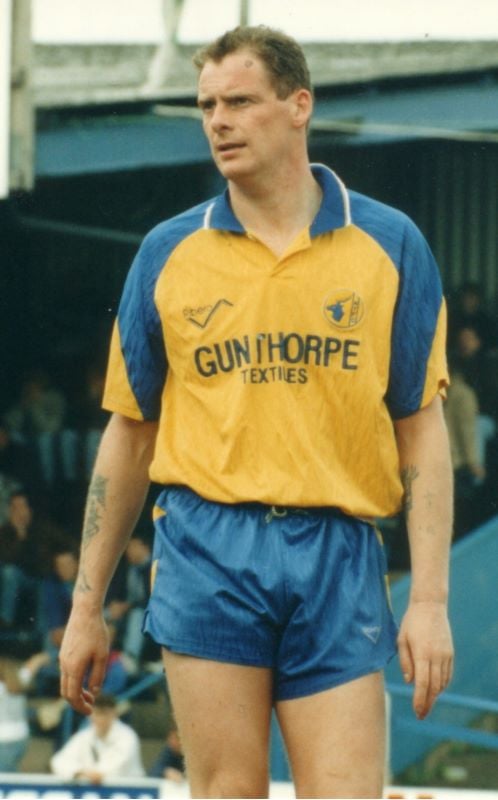 After the glorious promotion achieved on the final day of the previous season, season 1992-93 turned out to be a disappointment as Stags won just 11 of their 46 games to drop straight back to the bottom division of the Football League. The side got off to a terrible start with just two points from the opening five games, though they did at least put in good performances in only losing 2-1 to Newcastle over two legs in the League Cup.
After the glorious promotion achieved on the final day of the previous season, season 1992-93 turned out to be a disappointment as Stags won just 11 of their 46 games to drop straight back to the bottom division of the Football League. The side got off to a terrible start with just two points from the opening five games, though they did at least put in good performances in only losing 2-1 to Newcastle over two legs in the League Cup.
A 5-2 win over Bradford then provided one of few highlights during the season as defender Greg Fee slammed in two goals. The strike partnership of Phil Stant and Steve Wilkinson was broken up when boss George Foster was forced to sell Stant to Cardiff to reduce the club's debts at the end of November. Stant went on to help Cardiff to promotion.
By February, Stags had won just five games, but even a run of three wins in four games at the end of February never looked as though it would rescue the side. Relegation was sealed with two games still remaining, but at least there was another highlight with a remarkable 5-1 win on the plastic pitch at Preston in the penultimate game of the season. Steve Wilkinson was top scorer for the season with 11 goals, while Paul Holland was the Player of the Season.
During the summer of 1993, the club changed hands as Abacus Holdings sold the club to Keith Haslam, who was described as a Sheffield based property developer. Haslam, at 34, became the youngest-ever Stags' chairman, and the youngest in the Football League at that time. After just four games of the 1993-94 season, with two won and two lost, manager George Foster was sacked.
Haslam explained: "I felt that George's style of play and the whole strategy of his management was wrong. I don't believe he got the best out of our talented players."
Assistant Billy Dearden took over as caretaker and did a reasonable job, but suffered a few heavy defeats: 5-1 at Northampton, 4-0 at home to Chester and 4-1 at Wigan. In November, with Stags in 11th place, Andy King was appointed as new boss. King, the former Everton striker, was a surprise appointment, with no managerial experience having been acting as commercial manager at Luton. However Haslam explained that King was "bubbly and the sort of person we need to shake the football club into life again."
Stags won just one of the first eight games under King, but four wins out of five during February and March kept Stags firmly in mid-table and coincided with the introduction of young striker Stuart Hadley alongside Wilkinson. Stags finished the season in 12th place. Wilkinson was again top scorer with another 11 goals, while Paul Holland was again the Player of the Season.
The 1994-95 season was an exciting one, as Stags reached the play-offs and had a memorable victory over Leeds in the League Cup. The victory over Leeds was secured by a 1-0 win at Elland Road thanks to a Simon Ireland goal, and then a 0-0 draw in the second leg at Field Mill in the one of the finest nights in the club's history.
In the league, by mid-December, Stags were below mid-table, but a spectacular run of six wins in seven games, scoring an incredible 27 goals either side of Christmas, thrust Stags into the play-off places. The highlights were a 4-2 win over Chesterfield with a Wilkinson hat-trick, a 7-1 win at home to Hereford with an amazing 45 yard free-kick from full-back Ian Baraclough, followed by a 5-2 win at Scarborough the following day.
During this league run, Stags also played in the third round of the FA Cup losing out 3-2 to Wolves at Field Mill after leading 2-0. Striker O'Neil Donaldson, on loan from Doncaster, scored seven goals in five games during this purple patch, but joined Sheffield Wednesday in a move that left a bitter taste in the mouth. Five more wins out of six during February and March left Stags firmly in the play-off places.
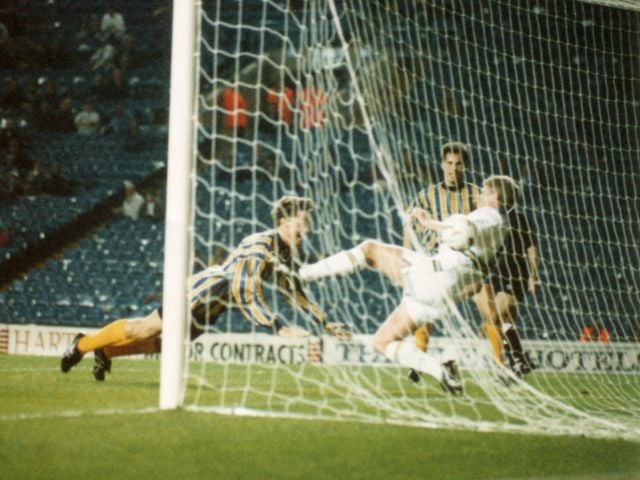
Despite only winning one of the final nine games, Stags still easily reached the play-offs, where they played Chesterfield. After a 1-1 draw in the first leg at Field Mill, Stags twice led at Saltergate before being taken into extra time at 2-2. Two sendings-off for the Stags turned the game into a nightmare as Chesterfield scored three times in extra time to win 6-3 on aggregate. Chesterfield went on to win promotion via a win over Bury at Wembley. It was a bitter pill to swallow, but Stags at least had the comfort of knowing that their incredible 84 goals scored was not bettered in the entire Football League.
Wilkinson was leading scorer for the third successive season, this time with 26 goals, followed by Hadley with 16, and midfielder Paul Holland with 13. Wilkinson was the Player of the Season, while Holland was chosen in the PFA Division Three Team of the Season. Holland's performances also earned him an England under-21 debut at the end of the season, but almost immediately he was sold to Sheffield United for £250,000.
The side that reached the play-offs was completely broken up as Wilkinson (who had become the sixth highest scorer in the club's history) left to join Preston for a ludicrous £90,000, and goalkeeper Darren Ward, whose performances for Stags had earned him Welsh under-21 caps, joined Notts County for an initial £150,000.
With Holland having left as well, the spine of the side was completely broken, and season 1995-96 was destined to be a term of disappointment. The season got off to a terrible start and Stags won only four of their first 24 games, to find themselves in the bottom three. By early October, Ian Baraclough had been sold to Notts County to remove yet more the previous season's successful side.
One of those four wins was an amazing 6-2 victory away to Wigan with a Stuart Hadley hat-trick. Hadley scored another hat-trick as Stags lost 4-3 against Chester at Field Mill. In the space of seven days during October, the side lost 6-0 at Preston as Steve Wilkinson predictably bagged a hat-trick, and lost 5-1 to Bury at Field Mill as Phil Stant scored four times.
A slightly better second half to the season saw Stags finish in 19th place in Division Three. Hadley finished top scorer with just eight goals, though six of those came in two games. Goalkeeper Ian Bowling, who had replaced Ward, was the Player of the Season.
The 1996-97 campaign also got off to a bad start with no wins in the first seven games. After just three of those games, boss Andy King was sacked. Haslam explained: "Andy's enthusiasm lifted the club for a time, but I feel he has lost his way."
Meanwhile, King said: "I love Mansfield Town and I am devastated by what has happened."
Club captain Steve Parkin, just 30 years old, took over as manager after a spell as caretaker boss, with Tony Ford as his assistant. By New Year, Stags had won just six of their 25 league games, and were lying fifth from bottom. But five wins out of eight games in January and February, and a further three wins around Easter catapulted Stags close to the play-offs.
When on-loan striker Richard Cresswell scored the only goal in a 1-0 win at Rochdale, Stags were only two points behind a play-off place with five games left. After a 0-0 draw with Fulham at Field Mill when the Londoners clinched promotion, Carlisle visited Field Mill and also clinched promotion with another 0-0 draw in front of the Sky Sports live TV cameras.
But Stags were denied what would have been a crucial victory when a header from centre-half Stuart Watkiss was deemed not to have crossed the line, though TV pictures clearly showed that it did. Defeat in the next match at Swansea meant Stags missed out. John Doolan was the leading scorer with seven goals - even fewer than Hadley's haul the previous season, and goalkeeper Bowling was again the Player of the Season. The average home attendance for the season slumped to an all-time low 2,283.
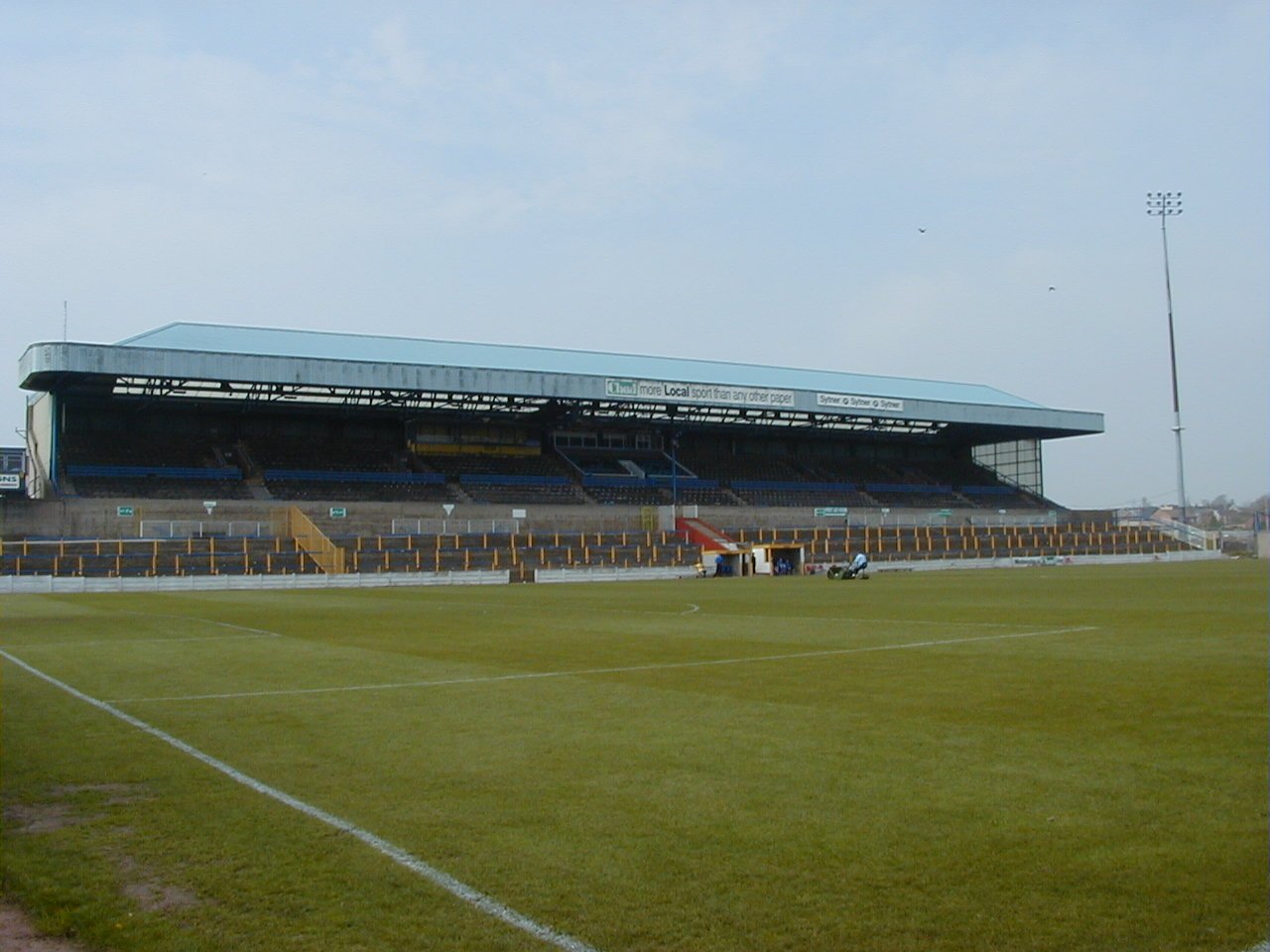 The 1997-98 season was mostly about Steve Whitehall. The 30-year-old striker was a proven goalscorer and joined from Rochdale. However it was youngster Iyseden Christie, signed from Coventry, who stole the early season limelight. After a goal in an opening day win over Hull, Christie scored a great hat-trick in a 4-2 win over First Division Stockport in the League Cup. Unfortunately, despite leading on aggregate in the second leg until the 89th minute, Stags ended up losing 8-7.
The 1997-98 season was mostly about Steve Whitehall. The 30-year-old striker was a proven goalscorer and joined from Rochdale. However it was youngster Iyseden Christie, signed from Coventry, who stole the early season limelight. After a goal in an opening day win over Hull, Christie scored a great hat-trick in a 4-2 win over First Division Stockport in the League Cup. Unfortunately, despite leading on aggregate in the second leg until the 89th minute, Stags ended up losing 8-7.
For the first half of the season, Stags hovered the bottom six with only six wins in the opening 24 games. But six wins during January and February hoisted the side into the top half of the table. Whitehall was scoring consistently and by the end of March, with six games to go, Mansfield were a mere six points behind the play-off places. But four successive draws, three of which had seen the Stags ahead, scuppered the chances. The last two games were won 1-0 and Mansfield thus ended the season unbeaten in 11 games, in 12th place, five points behind the play-off places.
Whitehall made a clean sweep of Player of the Season awards after his 26 goals, with Christie behind on 14 goals. But supporters' protests had overshadowed the last week of the season as the players had not been paid for a second successive month. Whitehall left the club in July to join Oldham. The striker had been unhappy at not being paid on time several times during the season, and had also been under strain, driving from his Warrington home to Mansfield on a consistent basis.
The 1998/99 campaign can best be described as a season of two halves. A final position of eighth was just one place behind the play-off places, but represented a huge disappointment, because for most of the season the team were positioned in the top seven.
Over the first 23 games, the Stags picked up 40 points, but over the last 23 games, only 27 points were earned. Mansfield's season was based around a home record that was the second best in the Division. By contrast, only four games were won away from Field Mill - three of these came in a spell of four away games during October and November - and Stags did not win a single away match after mid November.
There were many highlights of the season, such as a 3-1 win over eventual champions Brentford at Field Mill, and a 5-0 win over Barnet, featuring a Lee Peacock hat-trick, with national exposure gained as the first match ever played with a new yellow fluorescent ball, and with second-half commentary on BBC Radio 5 Live.
National exposure was also poured on Stags' player/assistant manager Tony Ford who at the age of 39, broke the all-time record of league appearances for an outfield player when he played his 825th game, away to Plymouth in January. A week later, Stags played Rotherham at Field Mill in a match live on Sky Sports TV.
Fate dealt Stags a bitter blow as two early goals were disallowed, and Rotherham went on to win 3-0. Despite a run of just four wins between early January and late April, the Stags remained either in the play-off places or just outside. Victory over Hartlepool in late April left Stags in a play-off place with just three games to play, but defeats against Exeter and Shrewsbury extinguished hopes of making the play-offs.
Goalkeeper Ian Bowling received two Player of the Season awards, with Lee Peacock receiving one other award of the Player of the Season variant. Peacock finished the season as top scorer with 19 goals. In early June, after seven players had been released, and the club had been placed under a transfer embargo, manager Steve Parkin resigned.
The embargo had been in place for much of the season after the club had to borrow money from the PFA as they were in debt. Parkin explained: "I have worked under these circumstances for a big part of my managerial career and now I feel the job has become untenable." Rumours abounded that Parkin was to take over as manager of Rochdale. He did, some weeks later.
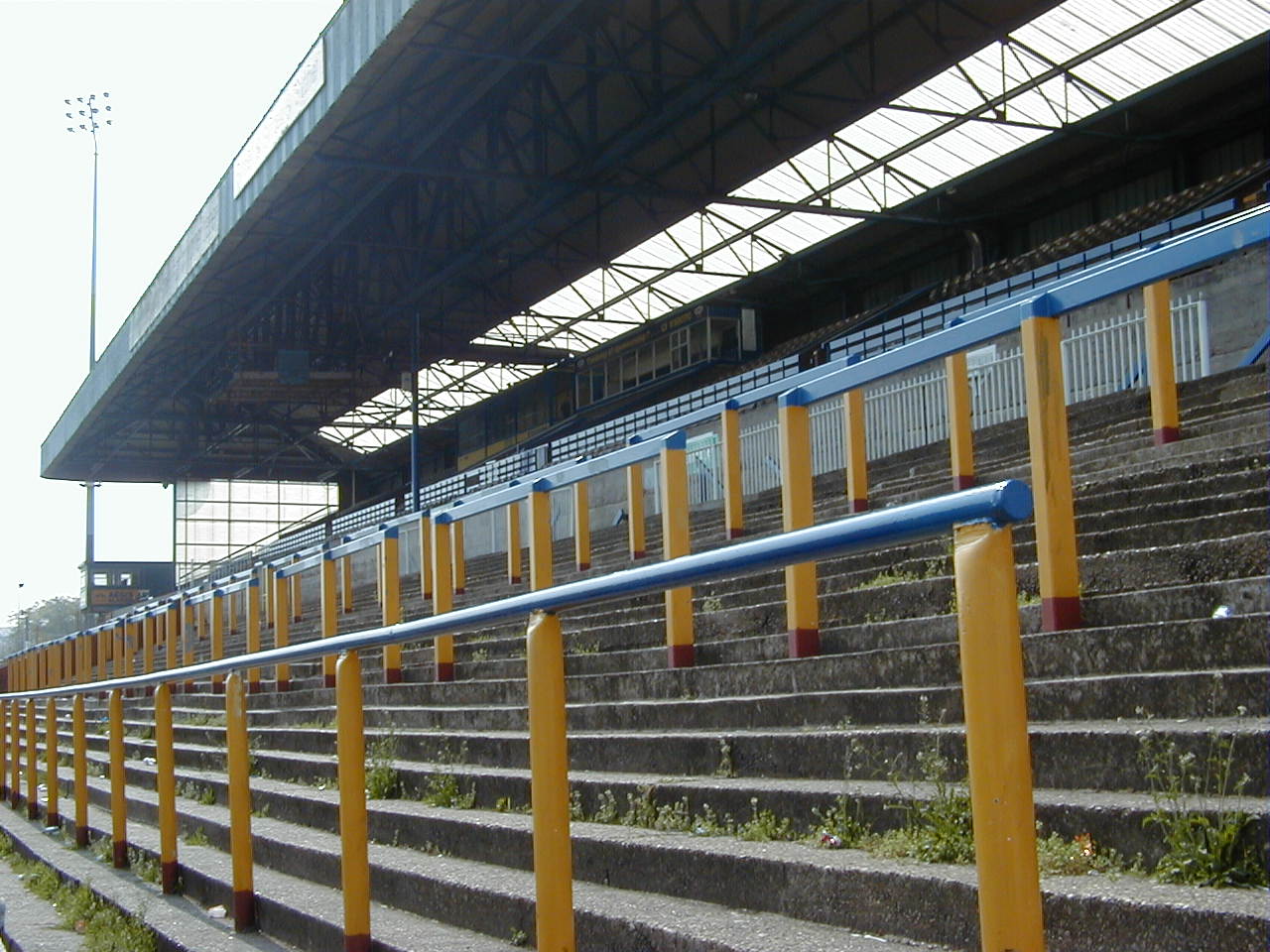
New manager Billy Dearden arrived at the club in July 1999, with only nine players in the squad, and hastily had to put together a makeshift side once the embargo had been lifted. He suffered a disastrous start to the season with a 6-0 defeat at Brighton. After the first five games, Stags were already hot favourites for relegation to the Conference, with just one point. But this was followed by an unbeaten run of five games including three victories, which lifted Stags up the table. And so, the season continued with inconsistent form, well-highlighted by two games in November where Stags lost 5-2 at Macclesfield and yet just four days later thrashed Lincoln by the same score. The departure of fans' favourite Lee Peacock to Manchester City in October was a bitter blow. But young Chris Greenacre who came in the opposite direction proved to be a fine replacement.
The season really took off with a fabulous run of 26 points from 12 games between the end of November and the beginning of February. The Stags found themselves in eighth position and just one place of the play-offs. But defeat at play-off rivals Peterborough followed by two home defeats seemed to kill off the challenge. However, back came Mansfield with three wins from the next four games, including a wonderful 3-2 win at leaders Rotherham, live on Sky Sports TV.
The performance at Rotherham was exhilarating and the quality of the goals left all Stags' fans in dreamland. Greenacre's strike was the clear goal of the season for Mansfield. With nine games left, Stags again found themselves just one place off the play-off zone. But the season ended badly, starting with a 5-0 defeat at bottom club Chester, and a run of eight games without a goal, including six successive defeats. The run of more than eight games without a goal - a total of 12 hours and 29 minutes - was easily the worst in the club's history.
In the final game of the season, Stags finally scored a goal, but could still only manage a draw and thus ended the season with two points from the final nine games. The final tally of 56 points saw Stags in 17th position.
There was some joy in the League Cup as Stags beat Nottingham Forest 1-0 in the second leg of the first round in a fine display, though Mansfield did lose on aggregate. Young defender Alistair Asher received two Player of the Season, with Tony Lormor receiving one other award. Lormor finished the season as top scorer with 11 goals.


